Paraphrasing
Paraphrasing a poem means to simplify it down to its most basic elements, clarifying along the way and choosing less complicated language. This, in turn, makes it easier to understand.
Through paraphrasing, readers come to understand the meanings behind different kinds of figurative languages, such as metaphors , similes , and allusions . There is a huge list of poetic techniques a writer can employ within a verse that can confuse and complicate the meaning. For example, let’s consider syntax . Syntax is the arrangement of words or phrases that creates a sentence. It’s often regarded as a set of normal rules for how a sentence, depending on the language, comes together. Often in poetry, especially that of the Victorian and Elizabethan ages, the syntax can appear jumbled. This is either because it is or because the speech patterns were different. Nowadays, it is less common, but poets do sometimes reverse the order of words to conform to a specific metrical pattern or make a statement of some kind.

Explore Paraphrasing
- 1 Example of Paraphrasing
- 2 Defining Unknown/Unusual Words
- 3 Paraphrasing as an Exercise
Example of Paraphrasing
Take a look at these lines from the fourteenth and fifteenth-century poet Ben Jonson ’s poem ‘ Song: to Celia ’:
Drink to me only with thine eyes, And I will pledge with mine; Or leave a kiss but in the cup, And I’ll not look for wine.
Not the most complicated of verses , but it serves as a standard example of how poetry from a different time period in which meter and rhyme were much more important than they are today, can become complicated. If I were to paraphrase this piece I might write it out as:
Use your eyes to pledge yourself to me, and I’ll use my eyes to pledge myself to you; Or, leave me a kiss only in the cup and I’ll look for the kiss instead of the wine.
There is still plenty of room for poetic interpretation in this rephrasing of Jonson’s verse, but it makes the lines a little clearer. Read more poetry from Ben Jonson .
Defining Unknown/Unusual Words
Another aspect, aside from the syntax, that a reader should keep in mind is the poet’s word choices.
Sometimes it feels as though you know what a word means but when you look it up, it actually means something quite different. This can be an important part of paraphrasing a poem. Particularly helpful if a word feels completely out of context . More often than not there is a secondary definition, one that was applicable at the time the poem was written but is no longer in use today. Sometimes, this makes all the difference and can lead you down a clear path to the subject and major themes of a text.
Paraphrasing as an Exercise
As you become a keen analyzer of poetry you will grow accustomed to automatically rearranging the syntax to make sense of the lines, but it is a good strategy, especially with the more complicated verses, of poets such as Milton , or the poetry of Spenser , to paraphrase as an exercise in your own ability to interpret. Ask yourself, what does this line really mean, and then see if you can mirror it in contemporary language.
Additionally, paraphrasing can come in handy when a poem is less narrative than it is emotional or evocative. Let’s take Guillaume Apollinaire ’s ‘Zone’ as an example. This is an incredibly complex poem. It lacks narrative, consistency, or plot . More than anything else it is a barrage of images that seek to take a reader from one place, state of being, and mindset to another. Take a look at these lines to get a feeling for the text:
You in Amsterdam with a girl you find pretty who is ugly She’s engaged to marry a student from Leyden Where you can rent rooms in Latin Cubicula locanda I remember spending three days there and three in Gouda
This is only one small part of the poem, but on a larger scale, paraphrasing might help. There are a huge number of images and themes to this text, but a few provide a reader with unifying strands of thought. Seek these out, collect them, and see how they all relate. In the case of ‘ Zone ,’ there are themes of memory, religion, spirituality, poverty, story-telling, and more.
What might the poet want to convey through the compression and expansion of these themes into a plotless string of images? Which lines stick out and how can you simplify them? Can they become representatives of larger sections of verse rather than a single line among dozens? While in the case of ‘ Zone ’ you might lose some detail, it will allow you to get to the heart of the larger connecting themes of Apollinaire’s poetry .
Home » Definition » Paraphrasing
The Definitive Literary Glossary Crafted by Experts
All terms defined are created by a team of talented literary experts, to provide an in-depth look into literary terms and poetry, like no other.
Cite This Page
Green, William. "Paraphrasing". Poem Analysis , https://poemanalysis.com/definition/paraphrasing/ . Accessed 21 June 2024.

Help Center
Request an Analysis
(not a member? Join now)
Poem PDF Guides
PDF Learning Library
Poetry + Newsletter
Poetry Archives
Poetry Explained
Poet Biographies
Useful Links
Poem Explorer
Poem Generator
Poem Solutions Limited, International House, 36-38 Cornhill, London, EC3V 3NG, United Kingdom
Discover and learn about the greatest poetry, straight to your inbox
Unlock the Secrets to Poetry
How to Paraphrase a Poem: A 5 Step-by-Step Guide
There are times when you may need to paraphrase a poem . If you want to know how to paraphrase a poem , read on.
Paraphrasing involves rewriting the words of another author in your own words. Getting it right is a skill. While you want to be careful not to use words that are too similar to the source to avoid being accused of plagiarism, you also need to ensure that the original text’s meaning remains intact. In academic writing, paraphrasing is a useful tool that allows you to reference the work of others without having to quote their work directly.
Why you would paraphrase sections of an article, essay, or novel is clear. But why would one paraphrase a poem ? Read on to see our step-by-step guide outlining how to paraphrase a poem correctly.
Why Would You Paraphrase a Poem?
1. carefully read through the poem a few times, 2. analyze the poem, 3. recite the poem in your own words, 4. start writing, 5. proofread your work.
If you’ve ever had to write an essay at college or university, you’ll be well-versed in the art of paraphrasing. Paraphrasing the words of another scholar or academic allows one to incorporate their research into your work skillfully. Apart from demonstrating that you’ve adequately understood your source material, paraphrasing also makes for writing that flows well. Your work reads more smoothly if you paraphrase than constantly insert direct quotes.
As you will undoubtedly know, paraphrasing other people’s words is OK as long as you reference their work. In the academic world, plagiarism is not allowed in any case.
Here are a few reasons for paraphrasing a poem :
- For your understanding: Many regard poetry as the most difficult literary form. This is because poems often contain figurative language, which is dense and challenging to unpack. By paraphrasing a poem in your own words, you can ensure that you clearly understand the figurative phrases and have grasped the meaning the poet is trying to convey.
- To save space: you may need to reference a piece of poetry in an essay; paraphrasing allows you to do this without including the whole poem
- When writing about a poem: As is the case with any other literary forms, such as novels or short stories, you need to refer to the content of a poem when you’re writing about it. Since you don’t always want to quote directly from a poem, you may choose to paraphrase lines from time to time.
- When trying to explain a poem: Paraphrasing a poem effectively conveys its meaning. If you’ve grasped a poem and try to help somebody else understand it, paraphrasing the poem’s lines in easy-to-understand, everyday language is a useful method.
You might also want to learn about a refrain in poems .
How To Paraphrase a Poem
The first step you need to take when paraphrasing somebody else’s words are to read their work carefully. This is especially important when paraphrasing a poem since this literary form is notoriously difficult to interpret. Ensure you grasp the meaning and feel a deep understanding of the themes and meanings of the poem before you begin paraphrasing.
Next, you need to go thoroughly analyze the poetry. This means that you should go through the poem line by line. Look up words in the dictionary that you don’t understand and carefully unpack similes, metaphors , symbolic sections, and other figurative phrases. Also, consider the poem’s structure since poetry often is just as important for meaning as the content. In addition, think about the period in which the poem was written and how this may have influenced how the poet has chosen to construct their work.

Once you’re quite certain that you understand all aspects of the poem , it’s time to start using your own words. Depending on how you plan to refer to the poem in your written work, you may choose to paraphrase line by line or in larger chunks, such as stanzas or sections. Before writing down your words, it makes sense first to recite them. Try to use common everyday language and keep things as simple as possible. The aim is not to create beautiful or ornate phrases but to reveal the essential meaning of a dense literary work in plain language.
After reciting your paraphrased version of the entire poem or sections of the poem , it’s time to put pen to paper. Since you’ve probably recited different versions of your own words by this point, you should have a clear idea of how you’d like to paraphrase various lines or sections of the poem .
If you get stuck, remember that one of the first steps you want to take is to write down the literal meaning of the poet’s words. For instance, Shakespeare’s line “If hairs be wires, black wires grow on her head,” can be paraphrased as “Her hair is coarse and dry instead of silky and soft.”
Also, while poets often condense their content to fit within the rhythm and meter of the poem , you are not limited by such constraints. It’s not that tricky to paraphrase poetic lines in your own words when you can fill in the spaces and missing words that a poet has consciously omitted. Since you’re rewriting a poem in prose form, remember that your paraphrased version should consist of full sentences.
Once you’ve completed your paraphrased version of the poem , you should proofread your work. First, read through your paraphrased version line by line or section by section, and double-check that you’ve captured the original work’s meaning. This is very important. Whether you’re using your paraphrased words in an essay or to explain the poem to students, it’s essential that you accurately portray the meaning the poet worked so hard to bring across.
Here are a few other things to look out for:
- Avoid overuse of synonyms: While it’s OK to replace the occasional word with its synonym, you should guard against using synonyms as your sole method of paraphrasing. When paraphrasing someone else’s words, you need to demonstrate that you understand the work by completely rewriting lines or sections in your own words. Rewriting original lines and just replacing some words with their synonyms constitutes plagiarism.
- Changing word order is not paraphrasing: Although this is a trick often employed by lazy students, simply shuffling the word order of a line does not equate to paraphrasing. Again, you need to rewrite the other author’s words in your own words. Otherwise, you are plagiarizing. In addition, simply rearranging the words of another author serves no purpose.
- Use the same point-of-view: Remember to retain the point-of-view of the original work when you’re paraphrasing. For instance, if a poem utilizes the first-person point-of-view, your paraphrased version should also be in the first person. For instance, the line “While I nodded, nearly napping, suddenly there came a tapping” can be paraphrased as “While I was falling asleep I suddenly heard a tapping sound.”
- Avoid adding your ideas: You should stay true to the original work when paraphrasing. While you should use your own words, avoid changing the original content or adding any of your ideas or opinions.
- Make sure to reference the original source : You must reference the origins of the poetry and credit the author, even when paraphrasing.
For more, check out our roundup of the best grammar checkers .
- How to Cite
- Language & Lit
- Rhyme & Rhythm
- The Rewrite
- Search Glass
How to Paraphrase a Poem
When you paraphrase a poem, use your own words to explain the major ideas line-by-line. Paraphrasing isn't the same as explicating or analyzing a poem. The goal is to rephrase the ideas in your own words without evaluating or addressing the author's hidden messages or underlying themes. A paraphrased poem is a literal translation in regular prose without rhyme or meter.
Create a Literal Translation
Read the entire poem once or twice to get a broad understanding of the storyline, characters and setting. Then, break the poem down word-by-word, phrase-by-phrase or line-by-line to paraphrase. Read a line or a stanza, look away from the poem and think about what the author is literally saying. Translate the words by restating them in a new way , using common, everyday language, suggests Kip Wheeler, English professor at Carson-Newman University in Tennessee. Use language that that you might use when talking to a teacher or an adult. Avoid slang and clichés and focus on the literal meaning of the words.
Avoid Replacing Words with Synonyms
Don't just replace all the important words with synonyms , according to Williams College in Massachusetts. You might use synonyms occasionally to identify important terms, but exchanging the author's original words for synonyms isn't paraphrasing. Consider ways to rearrange the words and substitute your own words to get across the same meaning.
For example, Edgar Allan Poe writes,
"Ah, distinctly I remember it was in the bleak December, And each separate dying ember wrought its ghost upon the floor," in his poem "The Raven.".
An effective paraphrase might state, "It's a cold December night, and the trees outside my window are barren. The moon casts shadows of the bare tree branches onto my bedroom floor, and the shadows resemble ghosts."
The poem is about a man who expresses his sadness about the death of his lover as a raven pecks ominously at his window. Poe wants readers to associate death with the haunting coldness of winter.
Expand the Text with Details
Expand the lines and stanzas in the poem by using full sentences to explain the poet's ideas , recommends Seamus Cooney, English professor at Western Michigan University University.
Poets often condense their ideas to make them fit within the meter and rhythm of the poem. When you paraphrase, fill in pieces that the author hints at but doesn't fully explain in detail. For example, in Emily Dickinson's poem "Because I Could Not Stop for Death" she says,
"Because I could not stop for Death, He kindly stopped for me."
A paraphrased version might say, "I realize that death is a natural part of life, and I can't delay or stop its inevitability. Fortunately, death is a polite, respectable force that doesn't treat me unfairly."
Dickinson wants readers to feel comfortable with death, without fearing it, and realize that it's a normal part of human existence.
Use the Same Point of View
Maintain the same point of view as the poet. Your paraphrase should parallel the poet's voice, tone and overall mood . For example, when paraphrasing, "Two roads diverged in a yellow wood, And sorry I could not travel both..." by Robert Frost in "The Road Not Taken", you might say,
"I had a hard time choosing between two paths in the colorful autumn forest. I wish I could have taken both routes to see where they'd take me."
Frost wants readers to understand that life presents choices, and at any given time, you'll have to choose which path to take.
In this example, you should maintain the first-person point of view throughout your entire paraphrase.
- Carson-Newman University: Paraphrasing and Summarizing -- The Good, The Bad, The Incoherent; Kip Wheeler
- Western Michigan University: What Is a Paraphrase and How Do You Write One?; Seamus Cooney
- Purdue Online Writing Lab: Paraphrasing
- Williams College: Tips on Paraphrasing
- Poetry Foundation; The Road Less Taken; Robert Frost
As curriculum developer and educator, Kristine Tucker has enjoyed the plethora of English assignments she's read (and graded!) over the years. Her experiences as vice-president of an energy consulting firm have given her the opportunity to explore business writing and HR. Tucker has a BA and holds Ohio teaching credentials.
Poetry & Poets
Explore the beauty of poetry – discover the poet within
What Does Paraphrase Mean In Poetry

In poetry, paraphrasing is a commonly used practice in which the basic meaning or message is altered or changed in some way. This is achieved in a variety of ways, but typically involves substituting synonyms, reordering words, and rearranging lines. Paraphrasing can help poets to communicate their ideas in a new and interesting way, allowing them to give readers a new interpretation of an original text. In addition, it can add depth and complexity to a poem and help to emphasize certain themes or points.
For example, a poet might use paraphrasing to re-imagine a famous poem, such as Shakespeare’s sonnet, in a modern context. Paraphrasing can also help to add texture and nuance to a poem and allow a writer to explore different word choices, as well as different grammatical structures. In addition, it can help to convey emotion and feelings in a more powerful way. For example, a poet might choose to rephrase a line in order to emphasize a particular feeling or emotion.
In addition to exploring key themes or ideas, a poem can also be re-imagined in order to juxtapose and compare different points of view. For example, a poet might choose to use paraphrasing to compare two opposing views on a particular issue. This can be particularly effective in a poem which deals with a complicated or controversial subject, as it allows the poet to explore both sides of an argument and reveal any underlying tensions which might exist between them.
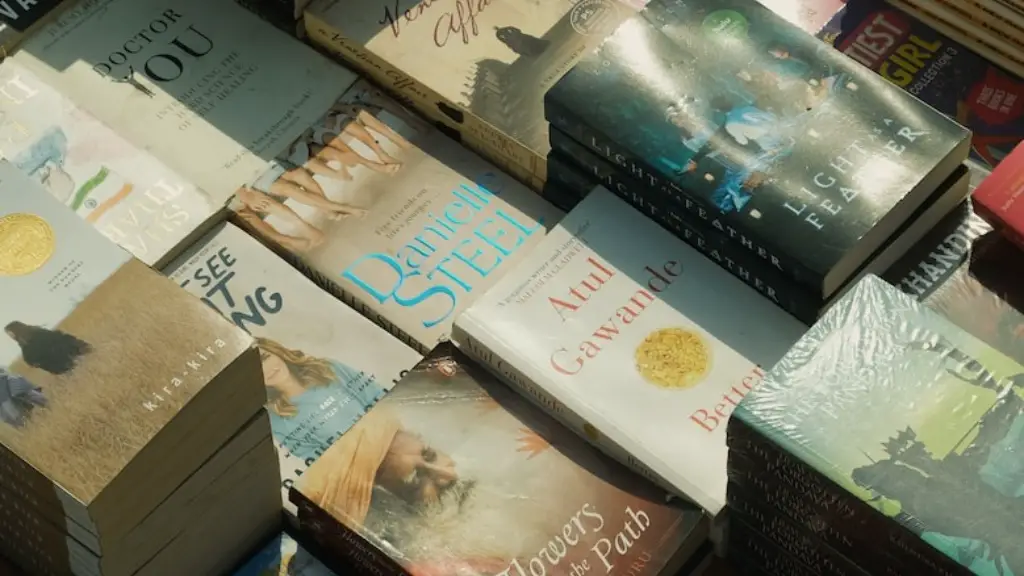
Another way in which paraphrasing can be used in poetry is to create a narrative or story. By remixing the words in a poem, a poet can help to paint a picture or tell a tale. This can be a powerful tool for creating a mood or atmosphere, as it allows the poet to take a familiar story or poem and give it a unique twist. By using paraphrasing, poets can also make clever use of metaphor and symbolism in order to create a vivid and evocative picture of a particular scene or feeling.
Finally, paraphrasing can also be used to transform a poem into a song. By utilizing a chorus or repeating words, a poet can create a catchy melody which helps to convey an idea or emotion. This is often used in folk music and other genres in which traditional songs are reinterpreted and adapted to fit a contemporary context.
Intentional Paraphrasing vs Unintentional Paraphrasing
Paraphrasing can be used in a variety of ways, which can sometimes make it difficult to tell whether a poem has been intentionally re-imagined or if the poet has simply borrowed ideas from another text. unintentional, or ‘plagiarised’ paraphrasing occurs when a poet simply copies another poet’s words, thereby taking credit for their work. This is considered to be a form of plagiarism, and is highly frowned upon in the literary world.
Intentional or ‘creative’ paraphrasing, on the other hand, is a technique which is widely accepted and encouraged. This occurs when a poet deliberately alters or rephrases a text in order to create something new and unique. This can often happen when a poet is inspired by an original poem, but wants to add something of their own to the mix. Intentional paraphrasing allows poets to both honor their source material and add their own flavor to the conversation, creating art that is both innovative and respectful.
Paraphrasing Techniques and Examples

There are a variety of techniques which can be used when paraphrasing a poem. One of the most common techniques involves changing the verbs and adjectives or replacing them with synonyms. By doing this, the poet can create a different tone or mood while keeping the core meaning of the poem intact. For example, Romeo’s famous “wherefore art thou Romeo” line from Shakespeare’s Romeo and Juliet could be rephrased as “so where is my Romeo?”.
Another technique which can be used is to rearrange the lines of the poem in order to give it a different focus. This can help to emphasize certain points or ideas, or to explore alternative interpretations of the poem. For example, the first two lines of William Wordsworth’s famous poem “I wandered lonely as a cloud” could be reworked as “Alone I drifted, cloud-like, through the world”, which emphasizes the poet’s sense of solitude.
Finally, some poets also use paraphrasing in order to change the form of a poem. This can be done by changing the pattern of the poem’s lines, rhythm, or rhyme scheme, or by using a different poetic structure such as a sonnet or villanelle. For example, William Blake’s “The Tyger” could be re-imagined as a poem in couplets, or the lines of a villanelle.
Paraphrasing in Speech
Paraphrasing is not only used in poetry, but can also be used in speech in order to make a point or to emphasize an idea. This is often done by re-framing an idea with simpler, more accessible language. For example, a political speech might include the line “We will create more jobs” re-framed as “We will give more people the opportunity to work”.

Paraphrasing can also be used to make a speech more interesting, as it allows the speaker to re-imagine and explore an idea in a new way. This can help to keep the audience engaged, as they are presented with something familiar but slightly different. For example, a commencement address might include the line “Life can be hard, but it is also full of joy” re-framed as “Life can be challenging, but it can also be incredibly rewarding.”
Paraphrasing is also a useful tool for clarifying or summarizing an idea, as it allows the speaker to make sure their message is clearly understood. For example, a speech about the importance of diversity might include the line “We need to work together to make sure everyone is represented” re-framed as “We must collaborate to ensure that everyone is given a voice.”
Paraphrasing in Media
Paraphrasing is not limited to poetry and speech, but can also be found in other forms of media such as movies and television. In film and television, writers often use paraphrasing in order to communicate important themes or messages to the audience. For example, a movie about racism might include the line “Everyone deserves respect” re-framed as “Everyone deserves to be treated equally.”
Paraphrasing can also be used in advertising, as it allows companies to quickly and succinctly communicate their message to their target audience. For example, a company might use a line such as “We are committed to making a difference” re-framed as “We are dedicated to making the world a better place.” This can help to communicate the company’s values and mission to their audience in a memorable way.

Finally, paraphrasing is also used in journalism in order to ensure that an idea is communicated as clearly and accurately as possible. For example, a news article about a political controversy might include the line “Politicians must work together to find a solution” re-phrased as “Politicians must collaborate in order to resolve the problem.”
Paraphrasing and Plagiarism
Paraphrasing can be a valuable tool for creating new, original poetry and other forms of art, however it is important to be aware of the potential risks associated with it, as it can easily cross the line into plagiarism. Plagiarism is considered to be a form of cheating, and is frowned upon both in the literary world, and in the academic world.
In order to avoid plagiarism, it is important to ensure that any work which is produced through paraphrasing is significantly different from the original text. This can be achieved through substituting words, reordering words, and rearranging lines. In addition, it is important to ensure that proper credit is given to the original author. These steps will help to ensure that any work which is created through paraphrasing is original, and will not be considered to be plagiarized.
Final Thoughts
Paraphrasing can be a powerful tool for poets and other artists, as it allows them to explore different interpretations of an original text. This can help to add depth, complexity, and emotion to a poem or other work of art. In addition, paraphrasing can be used in speech, advertising, and other forms of media in order to communicate ideas more effectively. However, it is important to be aware of the potential risks associated with it, as plagiarism can occur when paraphrasing is used incorrectly.

Minnie Walters
Minnie Walters is a passionate writer and lover of poetry. She has a deep knowledge and appreciation for the work of famous poets such as William Wordsworth, Emily Dickinson, Robert Frost, and many more. She hopes you will also fall in love with poetry!
Leave a Comment Cancel reply
- AI Content Shield
- AI KW Research
- AI Assistant
- SEO Optimizer
- AI KW Clustering
- Customer reviews
- The NLO Revolution
- Press Center
- Help Center
- Content Resources
- Facebook Group
Step-by-Step Guide: How do you Paraphrase a Poem?
Table of Contents
How do you paraphrase a poem ? How hard was it when you tried it?Simply reproducing the poem’s key concepts in your own words constitutes paraphrasing. In contrast to interpreting or explicating poetry, paraphrasing is distinct.
The primary purpose of paraphrasing is to restate the main ideas in your own words , not evaluate the original author’s arguments.
Through paraphrasing, readers can comprehend the meanings of figurative languages such as metaphors, similes, and allusions.
A vast number of poetic approaches can be used to confound and distort the meaning of a verse. For example, let’s consider syntax.
The arrangement of words or phrases that constitutes a sentence is called syntax. Depending on the language, it is commonly viewed as a standard set of principles for how a sentence is put together.
The syntax in poetry, especially of Victorian and Elizabethan eras, frequently appears jumbled. This is because the speech patterns were distinct. Poets sometimes reverse the order of words to adhere to a rhythmic pattern or express meaning.
No matter how hard a poem is to read, following the guidelines in this article will help you paraphrase them in minutes. Let’s dive in!
Key Considerations to Paraphrasing a Poem
Poem paraphrasing requires several considerations.
First, consider whether it is preferable to explicitly quote a few lines from the poetry rather than paraphrase them.
If the original words of the poem best convey the poem’s meaning, it is recommended that you quote them directly. This will assist preserve the effectiveness of the poem’s message.
If you answered “no” to this question, read on!
Before you can even attempt to paraphrase a few words from a poem, you must be familiar with the poem’s meaning . If not, you must reread the poem to get the message it is attempting to convey.
Close your copy of the poem and try to recite it in your own words after confirming that you are familiar with its meaning. Consider the meaning of the poem in your mind. This will allow you to have a few words to yourself. This is the first step toward accurately summarizing the poem.
Then, using a pen and paper (or a word processor such as Microsoft Word), rewrite the ideas you had when imagining the poem’s meaning. Ensure that you are not glancing at the copy of your poetry so that your writing is independent of the original text. You may now refer to what you have just composed as the “draft” of the paraphrase of your poetry.
Examine the poem’s original text to see if your words accurately reflect its meaning. Sentence structure and meaning should be revised in your initial paraphrase.
How do you Paraphrase a Poem? 3 Easy Steps
1. read and understand the poem.
To ensure that you comprehend the poem’s setting, plot, and characters, reread the entire poem multiple times.
Then, divide the poetry into lines or stanzas and try to comprehend what the author was trying to say.
2. Translate in your Words
Maintain the basic theme of the poem while translating the words. Translate using simple words that you would employ when conversing with an adult. Using everyday language, paraphrase the poem by restating its words.
You should not replace every term with its synonym, but you may occasionally utilize synonyms to identify significant words.
Remember, though, that replacing every word with its synonym is not paraphrasing. Consider swapping and rearranging the words to convey the same concept.
3. Elaborate the Author’s Message
Explain the stanzas and lines in the text using complete sentences to clarify the poet’s ideas. Typically, poets condense their thoughts to fit inside the rhythm and meter of the poem.
The author typically leaves some paraphrase questions in a poem; you should fill these gaps by elaborating in detail the author’s message.
Maintain the perspective of the author. Your revised version should reflect the author’s voice, tone, and emotion. Maintain the first-person viewpoint.
How do you paraphrase a stanza?
A stanza is a collection of lines that serve as a poem’s fundamental metric element. Therefore, the first four lines of a 12-line poem might be a stanza. A stanza can be identified by the number of lines it contains and its rhyme scheme or pattern, for example, C-D-C-D.
To paraphrase a stanza,
- you must understand each stanza’s meaning.
- Make sure you are not writing your text line by line.
- Create a new version with your own words.
- Utilize the author’s point of view.

Pam is an expert grammarian with years of experience teaching English, writing and ESL Grammar courses at the university level. She is enamored with all things language and fascinated with how we use words to shape our world.
Explore All Paraphrasing Tool Articles
Advanced & effective paraphrase simplify tool.
The paraphrase simplify tool is designed to paraphrase and simplify your text effectively. This tool can be used for in-depth…
- Paraphrasing Tool
What Is a Paraphrase Citation?
When you paraphrase, many people think you don’t have to give a citation. Understand that because you have used someone’s…
Paraphrasing Vs Summarizing: What’s the Difference?
Paraphrasing and summarizing are two similar activities, but they are not the same. To understand the difference between paraphrasing vs…
The Best Paraphrase Tools: A Review
When it comes to paraphrase tools, there are so many to choose. This is why we decided some paraphrase tool…
The Best Paraphrasing Hacks From Students Themselves
Did you have a tough concept that you had a lot of trouble understanding? Paraphrasing helps with that. But it…
Most Popular
11 days ago
Aithor Review
Now everyone can be a mathematician with the new apple math notes app, how to write a dissertation proposal, how to write a book title in an essay, elon musk criticizes apple’s ai approach and threatens device ban, how paraphrasing helps readers understand poetry.
freepik.com

Poetry often wraps profound meanings in a blanket of metaphors, rhythm, and complex imagery. Wait, what? Exactly. For many students, the complicated structure of poetry stops them from really appreciating it. However, there is one thing that might help, and it is paraphrasing. Paraphrasing, which basically means rewording and interpreting in a new way, helps us understand and appreciate poetry better .
Why is Poetry Sometimes Hard to Get?
If you ever wondered why is it difficult to read poetry, then we have the answer for you and it is quite simple – its use of language. Unlike prose, poetry often uses old-fashioned terms, abstract metaphors, and rich symbolism . Every word in a poem is carefully chosen and can carry multiple meanings. Moreover, poets frequently ‘bend’ the rules of grammar for artistic effect, which makes the message even harder to get. Well, it is also the cultural and historical contexts in which poems were written, because they can create a barrier for modern readers. Not many people now will understand the everyday challenges of the person from a couple hundred years ago, so it’s understandable why certain poetry is hard to relate to and therefore feel.
How Paraphrasing Poems Helps Readers Understand Better
Paraphrasing turns the complex and thought to grasp language of poetry into a simpler, more digestible form for readers. This process involves carefully rewriting the content of a poem in a way that keeps its original intent and essence, but choosing a more clear form for it. This way, paraphrasing simplifies the poem’s structure, and makes its central themes and emotions more accessible. This approach is like translating poetic language into everyday speech, so that the gap between the poet’s intricate expressions and the reader’s understanding is if not zero, but minimal at least.
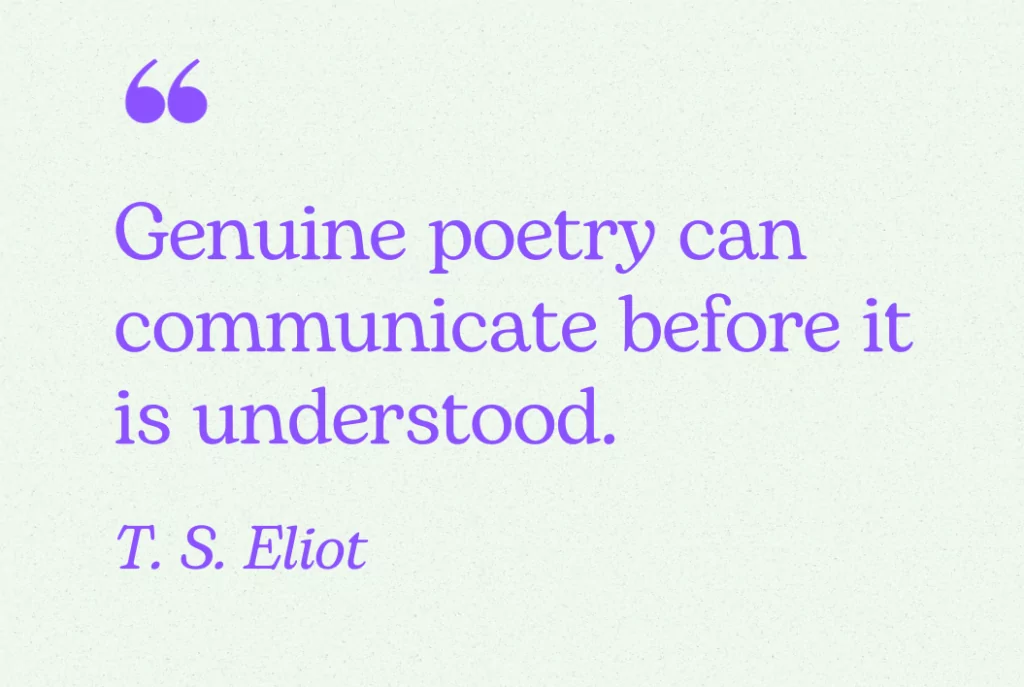
Preserving the Essence Through Archaic Terms
One significant aspect of poem paraphrase is its ability to maintain archaic terms that are almost central to the poem’s meaning. While the language of poetry can sometimes be ancient or even obscure (we see you, Shakespeare), these words often carry specific connotations and historical context. Thus, they are important to the poem’s integrity. Paraphrasing helps in keeping these terms while explaining their meaning in a modern context, so that the original essence and richness of the poem are not lost in translation, but the readers get it.
Personal Interpretations and Creative Thinking
Poetry uses similes and metaphors, which can be open to multiple interpretations. Paraphrasing encourages readers to create their own meanings for these figures of speech . After reformulating these poetic devices in their own words, readers engage more deeply with the text, which in turn create a more personal connection with the poem. This active engagement not only helps with basic understanding but also makes the experience of reading poetry more intimate and rewarding. After all, you’ve spent all that time trying to get it, might as well enjoy it.
Apart from that, paraphrasing inspires readers to come up with their own allusions and paradoxes when reading poems. This creative process not only helps you to get to know the poem and the author’s feelings and emotions, but also encourages a more active form of reading. As readers rephrase the text, they might see new insights and interpretations of the words.
Simplifying Figurative Language
Figurative language is a cornerstone of poetry and is often used to deliver complex emotions and ideas. Paraphrasing plays a key role in helping readers understand the various forms of figurative language, such as hyperbole, irony, and personification , so you might use a paraphrase helper . Readers can grasp the hidden meanings and themes that the poet intended to tell by breaking down these elements into simpler, more direct language.
Another poem too complicated to even read? Rewrite it with our Free Paraphraser
Comparing an original poem and its paraphrased version.
Paraphrasing poetry is a great exercise aimed at training your brain to pick up certain clues to uncover the meaning behind the words. It makes the whole process far more enjoyable, so let’s dive into the examples.
Original Poem: “Hope is the thing with feathers” by Emily Dickinson “Hope” is the thing with feathers That perches in the soul And sings the tune without the words And never stops – at all –
Paraphrased Version: Hope is like a bird with feathers that sits in our soul. It hums a wordless melody and never ceases to sing, no matter what.
In this paraphrase, Dickinson’s metaphor of hope as a bird is maintained, but the language is simplified for clarity. The essence of hope being an ever-present, uplifting presence in the soul is preserved, while the abstract notion is made more tangible.
Original Poem: “The Road Not Taken” by Robert Frost Two roads diverged in a yellow wood, And sorry I could not travel both And be one traveler, long I stood And looked down one as far as I could To where it bent in the undergrowth;
Paraphrased Version: In a forest with yellow leaves, I came upon two separate paths. Regretfully, I couldn’t take both routes. As a lone traveler, I stood for a long time and gazed down one path as far as possible until it disappeared in the shrubbery.
This paraphrase simplifies Frost’s language, making the dilemma of choosing a path in life more explicit. The essence of indecision and the metaphor for life’s choices are maintained, but the imagery and choice of words are made more accessible to contemporary readers.
What is paraphrasing in poetry?
Paraphrasing in poetry is the act of rewording a poem’s content into simpler, more accessible language while retaining its original meaning and essence. It involves interpreting the complex metaphors, imagery, and structural elements of a poem and translating them into an understandable form. This process allows the reader to comprehend the underlying themes, emotions, and messages conveyed by the poet, often using contemporary language or context to make the poem more relatable.
Why is paraphrasing important in understanding poetry?
Paraphrasing is important in understanding poetry because it helps to demystify complex language and abstract ideas. Poetry often uses dense metaphors, symbolic language, and unique structural elements that can be challenging for readers. Paraphrasing breaks down these complexities, making the poem’s themes, emotions, and intentions clearer. It serves as a bridge between the poet’s intricate expressions and the reader’s comprehension, enhancing the overall appreciation and understanding of the poetic work.
How does paraphrasing enhance poetry analysis?
Paraphrasing enhances poetry analysis by allowing a deeper examination of the poem’s themes, structure, and language. It encourages critical thinking, as readers must interpret the poet’s intent and convey it in simpler terms. This process reveals the layers of meaning in a poem and aids in understanding the nuances of poetic devices used. Paraphrasing also facilitates discussions and academic analysis, as it makes the poem more accessible to a broader audience, including those who may not be familiar with complex poetic forms.
Can you provide examples of paraphrased poetry?
Yes, an example of paraphrased poetry is Robert Frost’s “The Road Not Taken.” The original lines, “Two roads diverged in a yellow wood, / And sorry I could not travel both,” can be paraphrased as, “In a forest with yellow leaves, I came across two separate paths and regretted that I couldn’t take both.” This paraphrasing simplifies the language and imagery while maintaining the poem’s theme of choice and indecision. Another example is Emily Dickinson’s “Hope is the thing with feathers,” paraphrased as, “Hope is like a bird with feathers that sits in our soul and hums a melody continuously without words.”
Are there any tools or techniques for effective paraphrasing in poetry?
Effective paraphrasing in poetry can be aided by several tools and techniques. One important technique is close reading, which involves thoroughly analyzing the poem’s language, structure, and imagery. Another technique is to identify and understand the poem’s main themes and emotions before attempting to rephrase. Tools like thesauruses can help find simpler words or phrases. Additionally, online paraphrasing tools or software can provide initial rewordings, but they should be used cautiously, as they may not always capture the nuanced meanings intended in poetry. Ultimately, practice and a deep engagement with the text are key to mastering paraphrasing in poetry.
Follow us on Reddit for more insights and updates.
Comments (0)
Welcome to A*Help comments!
We’re all about debate and discussion at A*Help.
We value the diverse opinions of users, so you may find points of view that you don’t agree with. And that’s cool. However, there are certain things we’re not OK with: attempts to manipulate our data in any way, for example, or the posting of discriminative, offensive, hateful, or disparaging material.
Cancel reply
Your email address will not be published. Required fields are marked *
Save my name, email, and website in this browser for the next time I comment.
More from Paraphrasing Guides
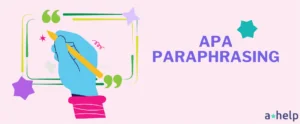
APA Paraphrasing

Why Is Paraphrasing Important?
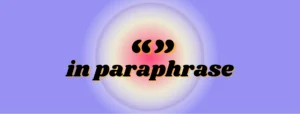
Do Paraphrases Need Quotation Marks
Remember Me
What is your profession ? Student Teacher Writer Other
Forgotten Password?
Username or Email
- Literary Terms
- Definition & Examples
- When & How to Use Paraphrase
I. What is a Paraphrase?
A paraphrase (pronounced par – uh -freyz) is a restatement or rewording of a paragraph or text, in order to borrow, clarify, or expand on information without plagiarizing. Paraphrasing is an important tool to use when writing research papers, essays , and pieces of journalism.
II. Examples of Paraphrasing
For examples of paraphrasing, consider these possible re-wordings of the same statement:
She angered me with her inappropriate comments, rumor-spreading, and disrespectfulness at the formal dinner table.
She made me angry when she was rude at dinner.
This paraphrase is an example of a rewording which shortens and simplifies while maintaining the same meaning.
Her impoliteness, gossiping, and general lack of respect at dinner infuriated me.
This rephrasing maintains the same meaning but is rearranged in a creative way.
I was mad when she started spreading rumors, making inappropriate comments, and disrespecting other guests at our dinner.
Another paraphrase, this rewording properly and interestingly rearranges the information provided in the original sentence.
III. Types of Paraphrasing
A. change of parts of speech.
Parts of speech ranging from verbs and nouns to adjectives and adverbs are replaced with new parts of speech in this type of paraphrasing. Here is an example:
Original Sentence:
The boy quickly ran across the finish line, seizing yet another victory.
Paraphrase:
The quick boy seized yet another victory when he ran across the finish line.
In this example, many parts of speech are changed: the adverb quickly becomes the adjective quick, and the verb phrase with the gerund seizing becomes the verb seized.
B. Change of Structure
This type of paraphrasing involves changing the sentence’s structure, sometimes creating a passive voice from an active voice and vice versa. The change in structure can be used to reflect the writer’s interpretation of the original quote. Here is an example of change of structure paraphrasing:
Puppies were adopted by numerous kind souls at the puppy drive.
Many kind souls adopted puppies during the puppy drive.
In this example, the object of the sentence (kind souls) becomes the subject with an active voice (adopted) rather than a passive voice (were adopted).
C. Reduction of Clauses
Reduction of clauses paraphrases reduce the number of clauses in a sentence, which can be interruptive or confusing, by incorporating the phrases into the sentence. Here is an example of reduction of clauses paraphrasing:
While I understand where you’re coming from, and truly respect your opinion, I wish you would express yourself more clearly, like Clara does.
I understand where you’re coming from and respect your opinion, but I wish you would be more like Clara and express yourself more clearly.
D. Synonym Replacement
Synonym replacement paraphrasing is one of the simplest forms of paraphrasing: replacing words with similar words, or synonyms. Here is an example:
The older citizens were honored with a parade for those once in the military.
Senior citizens were honored with a march for veterans.
In this example, many synonyms are used: older citizens are senior citizens, a parade becomes a march, and those once in the military refers to veterans.
IV. The Importance of Using Paraphrase
Paraphrasing is a way of referencing a source without directly quoting it or of further explaining a selected quote. Correct paraphrasing is important in that poor paraphrasing can result in accusations of plagiarism, or copying from a source without correctly citing it. Paraphrasing allows writers to examine the meaning of others’ work, creatively rephrase their statements, and craft information to suit an essay or composition’s goal or focus.
V. Paraphrase in Literature
Paraphrasing can be found in a variety of journalistic sources from newspapers to film documentaries to literary journals. Here are a few examples of paraphrasing in literature:
Someone once wrote that musicians are touched on the shoulder by God, and I think it’s true. You can make other people happy with music, but you can make yourself happy too.
In John Berendt’s nonfiction novel Midnight in the Garden of Good and Evil , a character references what someone has once written by paraphrasing their message.
I’m going to paraphrase Thoreau here… rather than love, than money, than faith, than fame, than fairness… give me truth.
In this example from the nonfiction novel Into the Wild , Jon Krakauer paraphrases Thoreau’s larger message of transcendence.
So far, Laurance’s critiques of new road-building schemes have been well received, but he expects that to change.
In Michelle Nijhuis’ article “What Roads Have Wrought,” William Laurance is paraphrased rather than quoted to express his general viewpoint.
VI. Paraphrase in Pop Culture
Paraphrasing is often found in pop culture when attempting to translate the language of older plays, poems, and stories, such as Shakespeare’s works. Here are a few examples of paraphrasing in pop culture:
10 Things I Hate About You (1999):
Just a minor encounter with the shrew… the mewling, rampalian wretch herself.
In the modern-day adaptation of Shakespeare’s The Taming of the Shrew , many characters ’ lines paraphrase Shakespeare’s originals. Here is Shakespeare’s version:
A meacock wretch can make the curstest shrew.
A Different World: Romeo, Oh Romeo
First, the student reads Shakespeare’s original words:
Oh gentle Romeo. If thou dost love, pronounce it faithfully. Or if thou thinkest I’m too quickly won, I’ll frown and be perverse and say thee nay, so thou wilt woo.
Then, she paraphrases to translate its meaning for modern ears:
It’s all about translation. Oh, sweet thang Romeo. If you think I’m all that, then step to me correctly. But if you think I’m a skeeze, I’ll be dissin’ and dismissin’, then you’ll be workin’ overtime getting’ me back.
VII. Related Terms
Like paraphrases, summaries are rewordings of original statements. Whereas paraphrases are precise and specific, summaries are brief and selective. Summaries report main points in a shortened version of the original, whereas paraphrases simply restate the original statement in a new way. Here is an example of summary versus paraphrase:
Original Statement:
At the party we had delicious red punch, a bunch of different appetizers, and a cookout. Since it was at the park, we played volleyball, went swimming, and sunbathed for fun.
At the party we enjoyed food and drink and various outdoor activities.
Here, the summary purposefully shortens the original statement while covering its major points.
At the party we drank some punch, ate a handful of appetizers, and had a cookout. The park allowed us to enjoy a number of enjoyable activities from volleyball to swimming to sunbathing.
As this example shows, the paraphrase rephrases the original statement and keeps more of its original content than the summary.
Translation
Although paraphrase sometimes translates difficult phrasing into more understandable phrasing, it is not literally considered translation. For something to be a translation, it must change writing in one language to another language. Here is an example of translation versus paraphrasing:
Original Phrase:
That’s life.
Translation into French:
C’est la vie.
That’s just how life goes sometimes.
Although we loosely may refer to paraphrase as translating ideas, technically it is not a tool of translation.
VIII. In Closing
Paraphrasing is an important tool for nonfiction writers, journalists, and essayists alike. It is a common proponent of news and reporting. Correct paraphrasing protects writers from plagiarism and allows them to creatively rephrase original works, incorporating them into their own compositions.
List of Terms
- Alliteration
- Amplification
- Anachronism
- Anthropomorphism
- Antonomasia
- APA Citation
- Aposiopesis
- Autobiography
- Bildungsroman
- Characterization
- Circumlocution
- Cliffhanger
- Comic Relief
- Connotation
- Deus ex machina
- Deuteragonist
- Doppelganger
- Double Entendre
- Dramatic irony
- Equivocation
- Extended Metaphor
- Figures of Speech
- Flash-forward
- Foreshadowing
- Intertextuality
- Juxtaposition
- Literary Device
- Malapropism
- Onomatopoeia
- Parallelism
- Pathetic Fallacy
- Personification
- Point of View
- Polysyndeton
- Protagonist
- Red Herring
- Rhetorical Device
- Rhetorical Question
- Science Fiction
- Self-Fulfilling Prophecy
- Synesthesia
- Turning Point
- Understatement
- Urban Legend
- Verisimilitude
- Essay Guide
- Cite This Website
- More from M-W
- To save this word, you'll need to log in. Log In
Definition of paraphrase
(Entry 1 of 2)
Definition of paraphrase (Entry 2 of 2)
intransitive verb
transitive verb
Did you know?
When we paraphrase, we provide a version that can exist beside the original (rather than replace it). We paraphrase all the time. When you tell a friend what someone else has said, you're almost always paraphrasing, since you're not repeating the exact words. If you go to hear a talk, you might paraphrase the speaker's main points afterward for your friends. And when writing a paper on a short story, you might start off your essay with a paraphrase of the plot. Paraphrasing is especially useful when dealing with poetry, since poetic language is often difficult and poems may have meanings that are hard to pin down.
- restatement
- translating
- translation
Examples of paraphrase in a Sentence
These examples are programmatically compiled from various online sources to illustrate current usage of the word 'paraphrase.' Any opinions expressed in the examples do not represent those of Merriam-Webster or its editors. Send us feedback about these examples.
Word History
Noun and Verb
Middle French, from Latin paraphrasis , from Greek, from paraphrazein to paraphrase, from para- + phrazein to point out
1548, in the meaning defined at sense 1
1598, in the meaning defined at transitive sense
Articles Related to paraphrase

The Words of the Week - Jan. 5
Dictionary lookups from Europe, higher education, and the new year

Dictionary Entries Near paraphrase
paraphrasis
Cite this Entry
“Paraphrase.” Merriam-Webster.com Dictionary , Merriam-Webster, https://www.merriam-webster.com/dictionary/paraphrase. Accessed 23 Jun. 2024.
Kids Definition
Kids definition of paraphrase.
Kids Definition of paraphrase (Entry 2 of 2)
More from Merriam-Webster on paraphrase
Nglish: Translation of paraphrase for Spanish Speakers
Britannica English: Translation of paraphrase for Arabic Speakers
Britannica.com: Encyclopedia article about paraphrase
Subscribe to America's largest dictionary and get thousands more definitions and advanced search—ad free!

Can you solve 4 words at once?
Word of the day.
See Definitions and Examples »
Get Word of the Day daily email!
Popular in Grammar & Usage
Plural and possessive names: a guide, more commonly misspelled words, your vs. you're: how to use them correctly, every letter is silent, sometimes: a-z list of examples, more commonly mispronounced words, popular in wordplay, 8 words for lesser-known musical instruments, birds say the darndest things, 10 words from taylor swift songs (merriam's version), 10 scrabble words without any vowels, 12 more bird names that sound like insults (and sometimes are), games & quizzes.

Definition of Paraphrase
Paraphrase and summary, examples of paraphrase in literature, example #1: romeo & juliet (by robert burns).
“But soft, what light through yonder window breaks? It is the east, and Juliet is the sun. Arise, fair sun, and kill the envious moon, Who is already sick and pale with grief, That thou, her maid, art far more fair than she … The brightness of her cheek would shame those stars As daylight doth a lamp; her eye in heaven Would through the airy region stream so bright That birds would sing and think it were not night .”
Paraphrase : But please wait and see the light from that window. It is the east, and my love Juliet is the sun. Come up beautiful sun, kill the jealous moon that is already sick and pale due to grief, as Juliet is more beautiful than the moon … The brightness of Juliet’s cheeks would surpass the brightness of stars, like the sun’s light outshines the light of a lamp. If her eyes were in the sky, they would be so bright through the spaces that birds might start singing, considering it was day light.
Example #2: The Sun Rising (By John Donne)
“Busy old fool, unruly sun, Why dost thou thus, Through windows and through curtains call on us?… Shine here to us, and thou art everywhere; This bed thy center is, these walls, thy sphere.”
Example #3: Pride & Prejudice (By Jane Austen)
“It is a truth universally acknowledged that a single man in possession of a good fortune must be in want of a wife.”
Paraphrase : Everyone agrees on this point, that a prosperous man needs to have a wife.
Example #4: Macbeth (By William Shakespeare)
“Whence is that knocking?— How is’t with me, when every noise appals me? What hands are here! Ha, they pluck out mine eyes. Will all great Neptune’s ocean wash this blood Clean from my hand? No, this my hand will rather The multitudinous seas incarnadine, Making the green one red.”
Function of Paraphrase
Post navigation.

How to Paraphrase Poetry?
Do you need to paraphrase a poem for an assignment?
Are you struggling to come up with your own words to express the same meaning as the original poem? Don’t worry, we’re here to help.
In this blog post, we will discuss how to paraphrase poetry in a way that is both accurate and creative.
We will provide tips and tricks for understanding the poem’s meaning, and show you how to express it in your own words.
So if you’re ready, let’s get started!
Table of contents
Why do people paraphrase poetry, read through the entire poetry, understand the poem’s context, use a similar point of view, break the poem down into its parts, be creative with your paraphrasing, check your work against the original, final thoughts.
There are a few different reasons why people might paraphrase poetry.
Sometimes, they need to use the poem in their own writing for an assignment or project. In other cases, they may want to use the poem as part of a presentation or speech.
Or they may simply want to understand it better by expressing it in their own words.
Regardless of the reason, paraphrasing poetry can be a difficult task. It’s important to capture the essence of the poem while also staying true to your own voice. But with a little practice and some helpful tips, you can do it!
Tips: How to Paraphrase Poetry
Simply said, paraphrasing poetry means retelling the poem’s essential concepts in your own words. The act of paraphrasing is distinct from the act of analyzing or explicating poetry.
The primary goal of paraphrasing is to restate the important themes in your own words, rather than to evaluate the ideas of the original author. The following guidelines will assist you in learning how to paraphrase poetry.
Before you start paraphrasing, it’s important to read the poem all the way through at least once. This will help you get a sense of the poem’s overall meaning and how its ideas are connected. As you read, pay attention to any words, phrases, or images that stand out to you. These may be important clues for understanding the poem’s meaning.
In order to paraphrase poetry accurately, it’s important to understand the poem’s context. This includes understanding who the author is , what time period the poem was written in, and any relevant cultural or historical context. All of this information can help you better understand the poem’s meaning.
Some poems are more difficult to understand than others. If you’re having trouble deciphering a poem, try doing some additional research on the author and the historical context surrounding the poem. This can help you get a better understanding of what the poem is trying to say.
When paraphrasing poetry, it’s important to use a similar point of view as the author. This means trying to put yourself in the same mindset as the author and writing from that perspective.
If you’re having trouble doing this, try reading about the author’s life and work to get a better understanding of their point of view. You can also look for quotes from the author that explain their thoughts and feelings about the poem.
More Related Articles
How Many Words Are In A Nonfiction Book?
How Many Pages Is The Average Novel?
How Long Does It Take To Self-publish A Book?
Once you have a general understanding of the poem’s meaning, it’s time to start breaking it down into its individual parts. This can be done by identifying the poem’s main themes and ideas. Once you have a list of these, you can start paraphrasing them in your own words.
It can also be helpful to identify any symbols or metaphors that are used in the poem. These can be tricky to paraphrase, but with a little effort, you can usually find a way to express them in your own words.
When paraphrasing poetry, it’s important to stay true to the original poem’s meaning while also being creative with your words . This means taking some liberties with the language but making sure that the overall message is still conveyed accurately.
Here are a few tips for being creative with your paraphrasing:
- Try retelling the poem in a different form, such as a song, rap, or spoken word.
- Use analogies or comparisons to help explain the poem’s concepts.
- Add your own personal reflections or interpretations to the poem.
- If you’re having trouble expressing a certain concept, try looking up synonyms or antonyms for words in the poem.
Once you’ve finished paraphrasing the poem, it’s important to check your work against the original. This will help you ensure that your paraphrasing is accurate and that you haven’t changed the meaning of the poem.
It’s also a good idea to have someone else read your paraphrase to make sure that it makes sense. Poetry can be tricky to understand, so it’s possible that you may have missed some important aspects of the poem’s meaning.
Benefits Of Paraphrasing A Poetry
There are many benefits of paraphrasing poetry. When you paraphrase a poem, you are forced to read and understand the poem in depth. This can help improve your reading comprehension skills and allow you to better analyze and understand literary works.
Paraphrasing a poem also helps improve your writing skills. By expressing the poem’s ideas in your own words, you are forced to think critically about the poem’s meaning and how to best communicate that meaning. This can help you become a better writer overall.
Finally, paraphrasing poetry can help you develop a deeper understanding of language and literary devices. By studying the way that the author uses language to convey their ideas, you can learn to use these devices in your own writing. This can make your writing more interesting and sophisticated.
Paraphrasing poetry can be a challenging but rewarding task. It’s important to take your time and make sure that you understand the poem’s meaning before starting to paraphrase it.
With a little practice, you’ll be able to accurately express the poem’s ideas in your own words. Not only will this help improve your writing skills, but it will also give you a deeper understanding of poetry and literary devices. So what are you waiting for? Get started paraphrasing some poems today!
Leave a Comment Cancel reply
Save my name, email, and website in this browser for the next time I comment.
Poem Paraphrasing Tool for Students
Welcome to our free paper rewriter. Follow the 4 steps below to use this paraphrasing tool for research papers:
- Copy and paste the paper you want to be rewritten;
- Choose the share of words to replace;
- Click on the button;
- Get the perfect result.
- ️📜 Why Using the Tool?
- The New Colossus
- Fire and Ice
- ️🔗 References
📜 Poem Paraphrasing Tool: Why Using It?
The language of poetry is figurative and often vague.
Poetry paraphrase means a verse is interpreted and rendered in a more “spoken” language.
But why may someone need to rewrite a poem?
- While preparing for in-class discussion, you can use the tool to help orient yourself within the text.
- The paraphraser clarifies the literary devices , notably allusions, metaphors, symbols , similes, and synecdoche.
- In the process, you’ll define the complicated and rarely used words.
- Poetry may have confusing syntax and logically unrelated sentences. Rewriting poetry, you simplify these patterns.
- Poets disregard many grammar rules. To create rhythm and rhyme, they may omit auxiliary verbs and other words with low meaning coefficient. The poetry paraphrasing tool eliminates these “drawbacks.”
- Paraphrasing any text helps to understand the plot. It is especially valid in terms of poetry.
- Translators of English poems use it to convey the meaning. Because at first, they need to understand the idea and purpose of every line and then only transmit it in the target language.
- A poem rewriter is especially helpful when the piece is too long to reword by hand. It will save you much time that you’ll be able to dedicate to the plot analysis .
👌 How to Paraphrase Poetry: 4 Tips
Below we describe the 4 tips that will help you effectively paraphrase poetry.
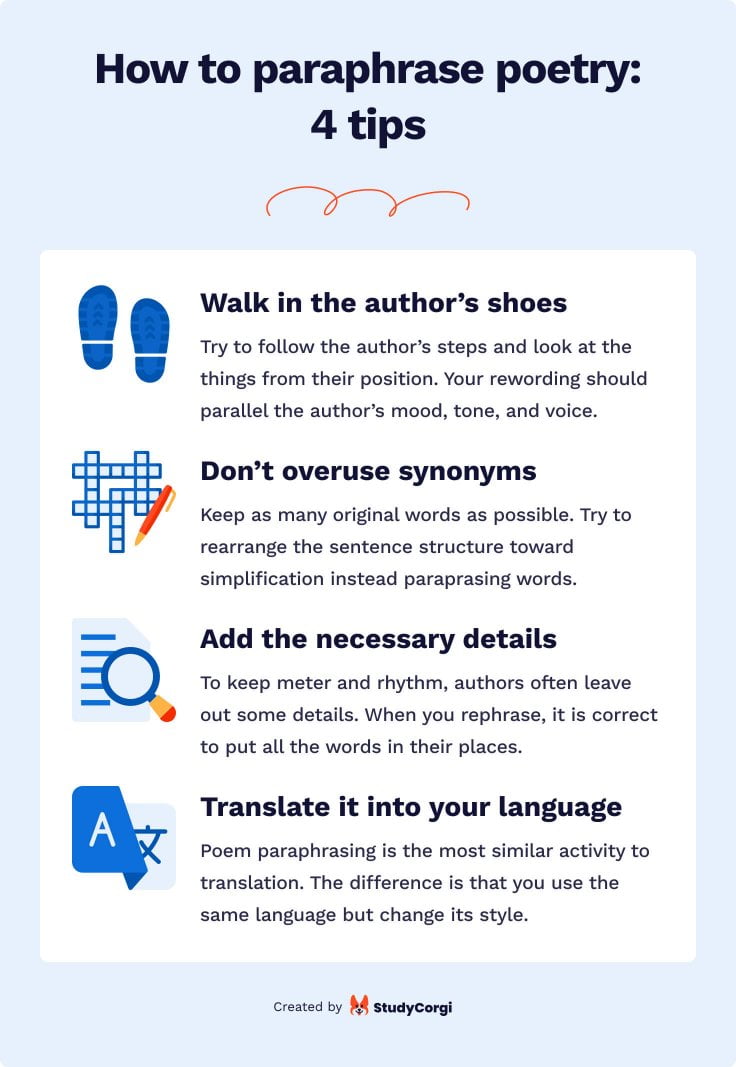
Walk in the Author’s Shoes
Try to follow the author’s steps and look at the things from their position.
Your rewording should parallel the author’s mood, tone, and voice.
If the poem is written in the first person, do the same. For example, the first lines of Maya Angelou’s Still I Rise can be paraphrased in the following way.
| Original version | Paraphrased version |
|---|---|
| “You may write me down in history With your bitter, twisted lies, You may trod me in the very dirt But still, like dust, I’ll rise.” | You can make people remember me according to your bitter, twisted lies. You can walk over me, pushing me deeper into the dirt, But even if you do so, I will inevitably rise as dust rises from the earth. |
Don’t Overuse Synonyms
Unlike paraphrasing the prose, keeping as many original words as possible is better.
You will soon notice that preserving even 20% is a challenging task. This advice does not apply to archaic or narrowly specialized terms.
Meanwhile, it is highly advisable to rearrange the sentence structure (toward simplification). The only criterion is to keep the original message. An illustrative example can be made based on Elizabeth Bishop’s One Art .
| Original version | Paraphrased version |
|---|---|
| “The art of losing isn’t hard to master; so many things seem filled with the intent to be lost that their loss is no disaster.” | It is easy to master the art of losing. Most things in the world can be easily lost, so there is no point getting upset. |
Add the Necessary Details
The meter and rhythm are critical in poetry. Because of that, authors often have no choice but to leave out some details that may be evident to the reader.
When you rephrase, it is correct to put all the words in their places, especially when the poet gave nothing but a hint.
For example, compare the original and paraphrased versions of Gwendolyn Brook’s We Real Cool .
| Original version | Paraphrased version |
|---|---|
| “...We Sing sin. We Thin gin. We Jazz June. We Die soon.” | We celebrate misbehavior. We drink cheap alcohol. We listen to Jazz in June. But while doing that all, we may die soon. |
Translate It into the Language You Speak
Poem paraphrasing is the most similar activity to translation.
The difference is that you use the same language but change its style.
Compare the last lines of Ozymandias by Percy Bysshe Shelley and our rewording:
| Original version | Paraphrased version |
|---|---|
| “Look on my Works, ye Mighty, and despair! Nothing beside remains. Round the decay Of that colossal Wreck, boundless and bare The lone and level sands stretch far away.” | Those who think you are powerful look at what I have built and despair seeing my accomplishments. Nothing else has been left here. Around the remains of the large ruined statue, there is a boundless and bare desert, where empty and level sands stretch as far as the eye can see. |
🖋️ Poem Paraphrasing: 3 Examples
To better understand how to do this task, we have prepared 3 paraphrases of the best samples of English poetry. You can also compare them with the originals available through the links.
Sonnet 18 Paraphrased
It is a sonnet by William Shakespeare written somewhere in the 1590s. In this poem, the speaker admires the beauty of his beloved one and promises that it will always live in his sonnet. The language is archaic and complicated, so you shall read the original several times to understand its meaning.
Read Shakespeare’s Sonnet 18 paraphrased below.
Can I compare you to a summer day? You are lovelier and softer. In May, rough winds shake the fragile flower buds, And summer is always too short. Sometimes the Sun shines too hot, And its golden face gets dimmed; And the beauty of beautiful people decays By chance or natural causes. But your eternal summer will never fade, You will not lose your beauty, And death will not be able to boast of having taken you Because you live in my eternal lines. As long as people breathe and have eyes to see, As long as this sonnet exists, it will make you alive.
The New Colossus Paraphrased
Emma Lazarus created the poem in 1883 to raise funds for the Statue of Liberty . Now, it is engraved on the monument’s base. Lazarus’ sonnet recognized the statue’s primary role of welcoming those who seek refuge. You can check The New Colossus paraphrased below.
Different from the giant bronze statue of Helios in the Ancient Greek Rhodes, Whose limbs joined two sides of a harbor, commemorating a military victory, Here, at an American shoreline There is a statue of a powerful woman with a torch, the flame of which Is electric and lights up the sky. Her name Is the Mother of Exiles. Her hand with a beacon Welcomes people from around the globe. Her gentle gaze Commands the harbor in the cities of New York and Brooklyn. “Ancient European countries, you can keep your history,” she says With her silent lips. “But give me your tired and poor People who strive for freedom. These people have been abandoned and forgotten by your overpopulated lands. Send the homeless and miserable to me, As I raise my lamp over the gateway to America.”
Fire and Ice Paraphrased
Robert Frost created the poem Fire and Ice in 1920 , soon after WWI. The title symbolizes the two apocalyptic scenarios. Fire represents desire, and ice stands for hatred. You can read Fire and Ice paraphrased below.
Some people say the fire will bring the end to the world, Others say that it will be the ice. But as far as I have experienced desire, I believe that fire will be the case. But if the world had to be destroyed twice, I think I have also experienced hatred enough To say that ice Would also fit this purpose Perfectly well.
Thank you for reading this article! If you are not completely satisfied with the result of paraphrasing, try one of our highly specialized tools for various types of content:
- Essay rephraser
- Paragraph rewriter
- Sentence rewriter
- Phrase rewriter
- Paper rewriter
- Thesis rephraser
- Text reworder
- Poem paraphraser
- Essay reworder
❓ Poem Rewriter FAQ
How does a poem paraphrasing tool work.
A paraphrase generator for poems changes the pre-set percentage of words with synonyms. It also preserves the arrangement of lines and sentences, which is critical for poetry rewording. Most of them are free (with some exceptions) and available online without registration or subscription. You only need a browser.
What Does It Mean to Paraphrase a Poem?
You should transmit the author’s ideas line-by-line in your own words without evaluation, analysis or explanations. Neither should you address the underlying messages or principal themes. In other words, you provide a translation of the verse in regular prose and common language.
How to Paraphrase a Poem?
- Read the whole poem. You will often get the meaning only after you finish the last line.
- Look up the meaning of the words you don’t know.
- Rephrase the piece line-by-line, using the author’s words but changing the sentence structure.
- Replace the uncommon words with their everyday synonyms.
- Abstain from interpreting and analyzing but add details whenever necessary.
🔗 References
- How to Paraphrase a Poem with a Paraphrasing Site - Medium
- How do you paraphrase a poem? What are some tips? - Quora
- Paraphrasing through Poetry - University Digital Conservancy
- Poetry and the Possibility of Paraphrase | Oxford
- On What To Pay Attention When Paraphrasing a Poem ... - Issuu
- Examples of Paraphrasing Without Plagiarizing
Paraphrasing Tool
Paraphrasing Tool in partnership with QuillBot. Paraphrase everywhere with the free Chrome Extension .
Try our other writing services

Avoid plagiarism in your paraphrased text
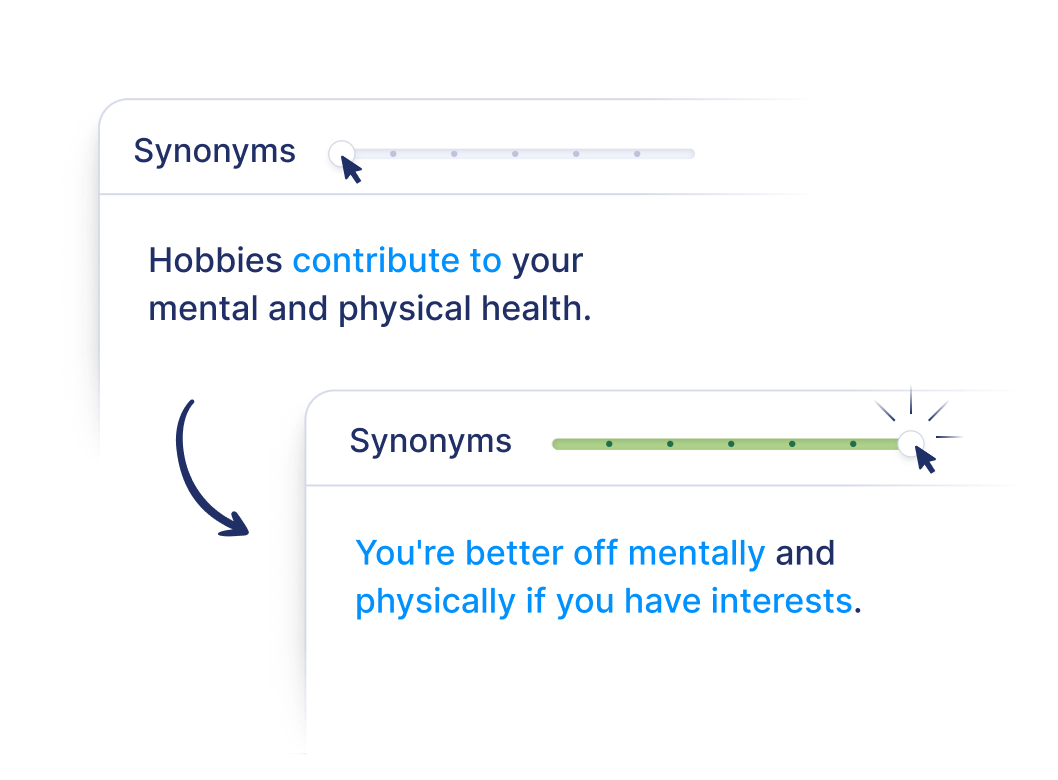
What is a paraphrasing tool?
This AI-powered paraphrasing tool lets you rewrite text in your own words. Use it to paraphrase articles, essays, and other pieces of text. You can also use it to rephrase sentences and find synonyms for individual words. And the best part? It’s all 100% free!
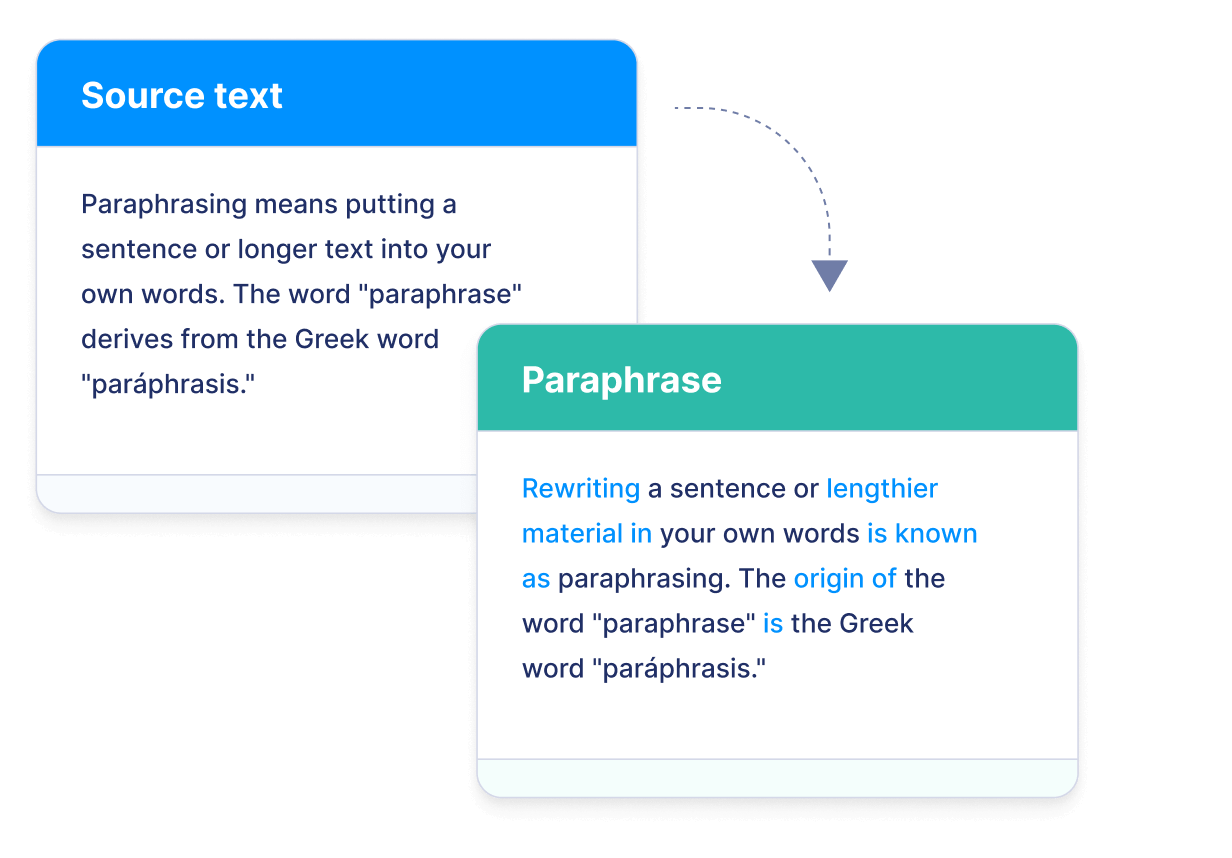
What is paraphrasing?
Paraphrasing involves expressing someone else’s ideas or thoughts in your own words while maintaining the original meaning. Paraphrasing tools can help you quickly reword text by replacing certain words with synonyms or restructuring sentences. They can also make your text more concise, clear, and suitable for a specific audience. Paraphrasing is an essential skill in academic writing and professional communication.

Why use this paraphrasing tool?
- Save time: Gone are the days when you had to reword sentences yourself; now you can rewrite an individual sentence or a complete text with one click.
- Improve your writing: Your writing will always be clear and easy to understand. Automatically ensure consistent language throughout.
- Preserve original meaning: Paraphrase without fear of losing the point of your text.
- No annoying ads: We care about the user experience, so we don’t run any ads.
- Accurate: Reliable and grammatically correct paraphrasing.
- No sign-up required: We don’t need your data for you to use our paraphrasing tool.
- Super simple to use: A simple interface even your grandma could use.
- It’s 100% free: No hidden costs, just unlimited use of a free paraphrasing tool.
People are in love with our paraphrasing tool

No Signup Needed
You don’t have to register or sign up. Insert your text and get started right away.

The Paraphraser is Ad-Free
Don’t wait for ads or distractions. The paraphrasing tool is ad-free!

Multi-lingual
Use our paraphraser for texts in different languages.
Features of the paraphrasing tool

Rephrase individual sentences
With the Scribbr Paraphrasing Tool, you can easily reformulate individual sentences.
- Write varied headlines
- Rephrase the subject line of an email
- Create unique image captions
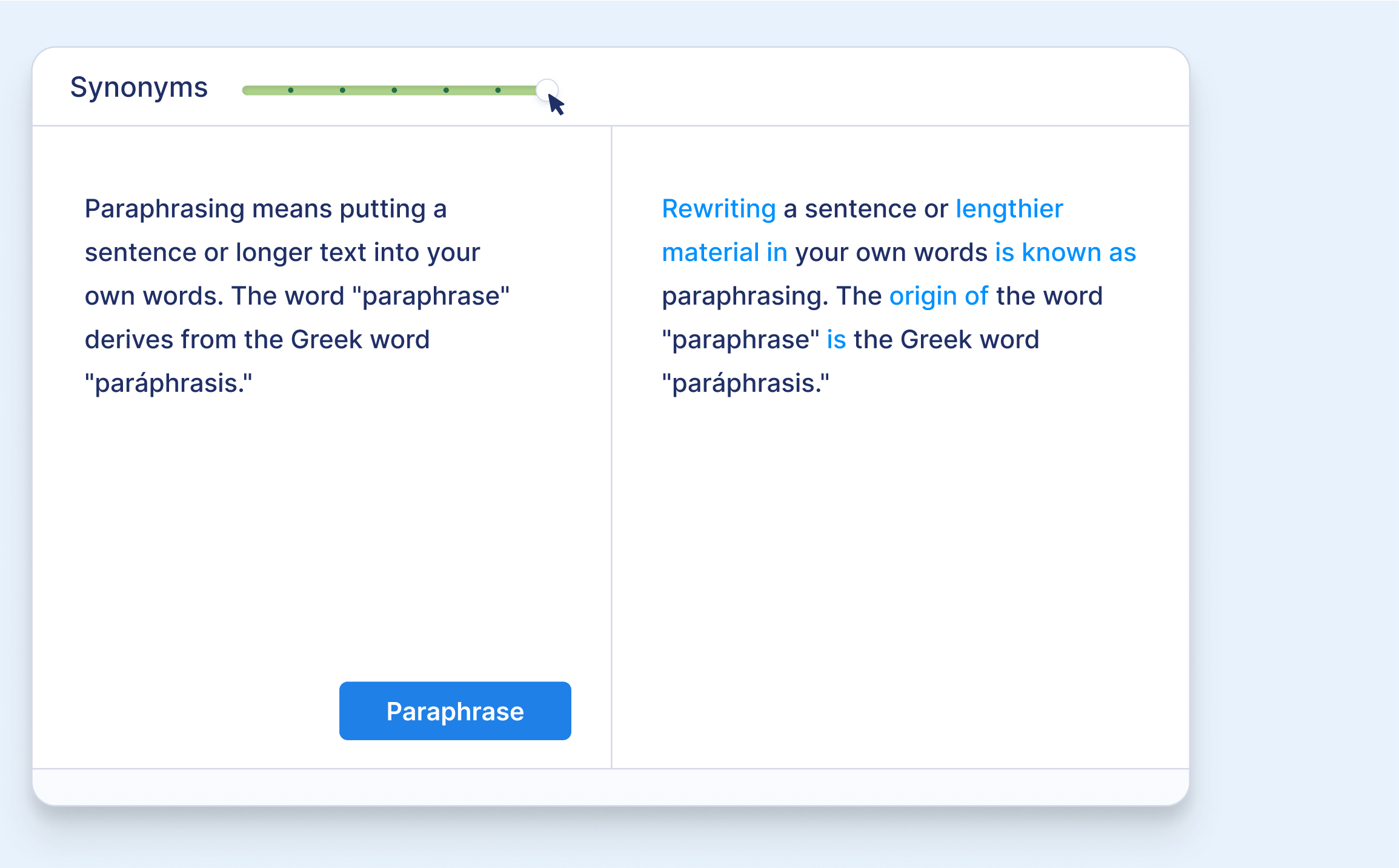
Paraphrase a whole text
Our paraphraser can also help with longer passages (up to 125 words per input). Upload your document or copy your text into the input field.
With one click, you can reformulate the entire text.

Find synonyms with ease
Simply click on any word to open the interactive thesaurus.
- Choose from a list of suggested synonyms
- Find the synonym with the most appropriate meaning
- Replace the word with a single click
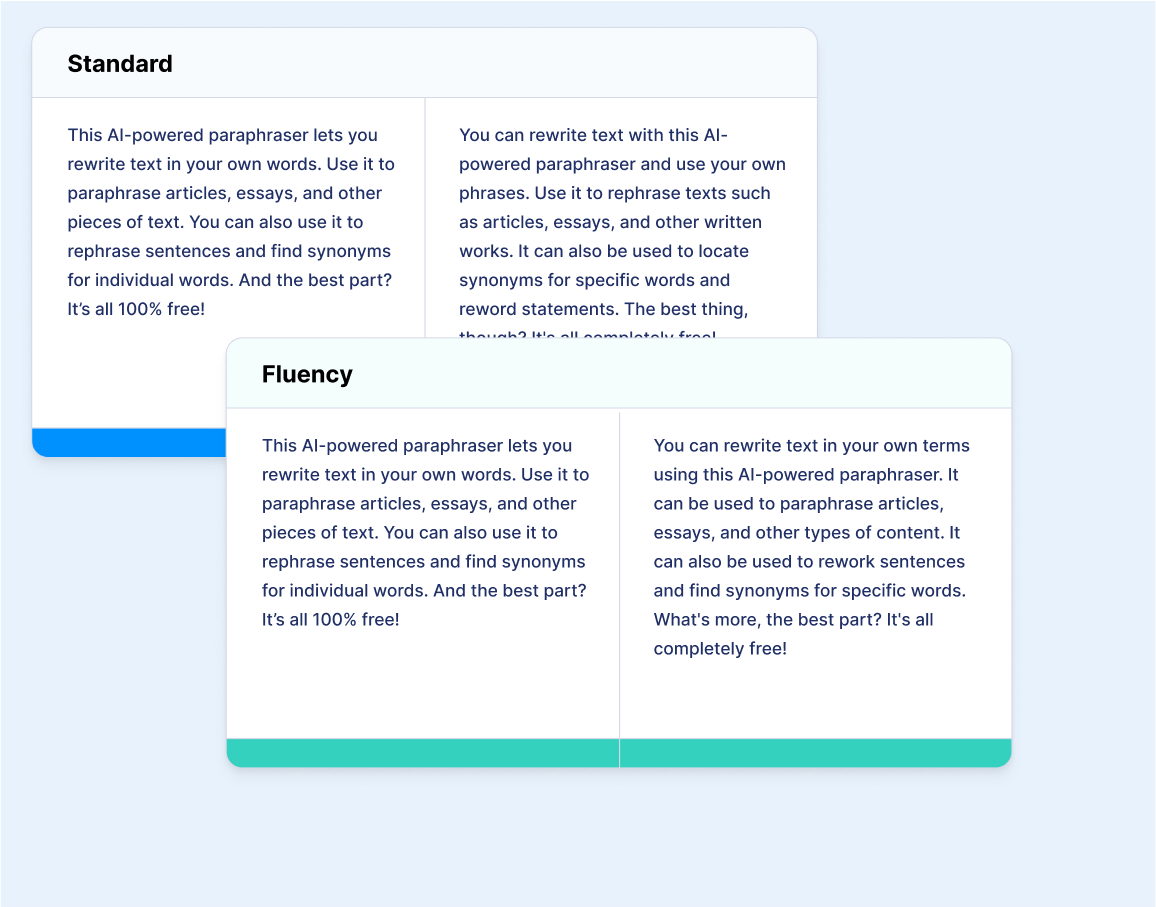
Paraphrase in two ways
- Standard: Offers a compromise between modifying and preserving the meaning of the original text
- Fluency: Improves language and corrects grammatical mistakes

Upload different types of documents
Upload any Microsoft Word document, Google Doc, or PDF into the paraphrasing tool.
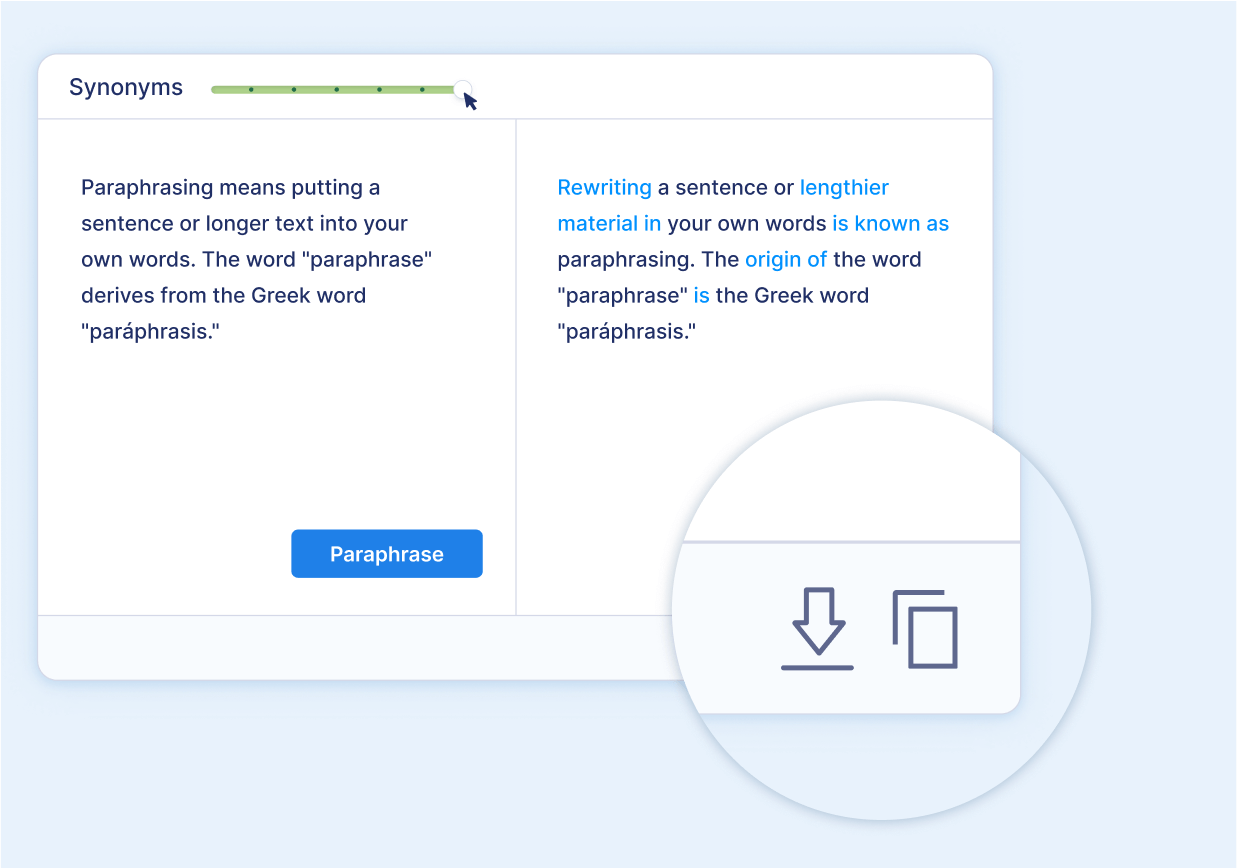
Download or copy your results
After you’re done, you can easily download or copy your text to use somewhere else.

Powered by AI
The paraphrasing tool uses natural language processing to rewrite any text you give it. This way, you can paraphrase any text within seconds.
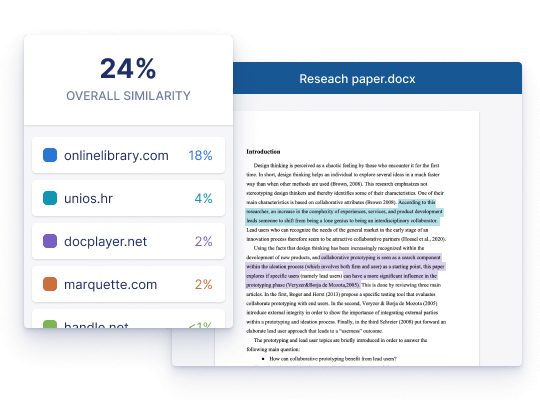
Avoid accidental plagiarism
Want to make sure your document is plagiarism-free? In addition to our paraphrasing tool, which will help you rephrase sentences, quotations, or paragraphs correctly, you can also use our anti-plagiarism software to make sure your document is unique and not plagiarized.
Scribbr’s anti-plagiarism software enables you to:
- Detect plagiarism more accurately than other tools
- Ensure that your paraphrased text is valid
- Highlight the sources that are most similar to your text
Start for free
How does this paraphrasing tool work?
1. put your text into the paraphraser, 2. select your method of paraphrasing, 3. select the quantity of synonyms you want, 4. edit your text where needed, who can use this paraphrasing tool.

Paraphrasing tools can help students to understand texts and improve the quality of their writing.

Create original lesson plans, presentations, or other educational materials.

Researchers
Explain complex concepts or ideas to a wider audience.

Journalists
Quickly and easily rephrase text to avoid repetitive language.

Copywriters
By using a paraphrasing tool, you can quickly and easily rework existing content to create something new and unique.

Bloggers can rewrite existing content to make it their own.

Writers who need to rewrite content, such as adapting an article for a different context or writing content for a different audience.

A paraphrasing tool lets you quickly rewrite your original content for each medium, ensuring you reach the right audience on each platform.
The all-purpose paraphrasing tool
The Scribbr Paraphrasing Tool is the perfect assistant in a variety of contexts.

Brainstorming
Writer’s block? Use our paraphraser to get some inspiration.

Professional communication
Produce creative headings for your blog posts or PowerPoint slides.

Academic writing
Paraphrase sources smoothly in your thesis or research paper.

Social media
Craft memorable captions and content for your social media posts.
Paraphrase text online, for free
The Scribbr Paraphrasing Tool lets you rewrite as many sentences as you want—for free.
| 💶 100% free | Rephrase as many texts as you want |
|---|---|
| 🟢 No login | No registration needed |
| 📜 Sentences & paragraphs | Suitable for individual sentences or whole paragraphs |
| 🖍️ Choice of writing styles | For school, university, or work |
| ⭐️ Rating | based on 13,185 reviews |
Write with 100% confidence 👉
Scribbr & academic integrity.
Scribbr is committed to protecting academic integrity. Our plagiarism checker , AI Detector , Citation Generator , proofreading services , paraphrasing tool, grammar checker , summarizer , and free Knowledge Base content are designed to help students produce quality academic papers.
Ask our team
Want to contact us directly? No problem. We are always here for you.
- Email [email protected]
- Start live chat
- Call +1 (510) 822-8066
- WhatsApp +31 20 261 6040

Frequently asked questions
The act of putting someone else’s ideas or words into your own words is called paraphrasing, rephrasing, or rewording. Even though they are often used interchangeably, the terms can mean slightly different things:
Paraphrasing is restating someone else’s ideas or words in your own words while retaining their meaning. Paraphrasing changes sentence structure, word choice, and sentence length to convey the same meaning.
Rephrasing may involve more substantial changes to the original text, including changing the order of sentences or the overall structure of the text.
Rewording is changing individual words in a text without changing its meaning or structure, often using synonyms.
It can. One of the two methods of paraphrasing is called “Fluency.” This will improve the language and fix grammatical errors in the text you’re paraphrasing.
Paraphrasing and using a paraphrasing tool aren’t cheating. It’s a great tool for saving time and coming up with new ways to express yourself in writing. However, always be sure to credit your sources. Avoid plagiarism.
If you don’t properly cite text paraphrased from another source, you’re plagiarizing. If you use someone else’s text and paraphrase it, you need to credit the original source. You can do that by using citations. There are different styles, like APA, MLA, Harvard, and Chicago. Find more information about citing sources here.
Paraphrasing without crediting the original author is a form of plagiarism , because you’re presenting someone else’s ideas as if they were your own.
However, paraphrasing is not plagiarism if you correctly cite the source . This means including an in-text citation and a full reference, formatted according to your required citation style .
As well as citing, make sure that any paraphrased text is completely rewritten in your own words.
Plagiarism means using someone else’s words or ideas and passing them off as your own. Paraphrasing means putting someone else’s ideas in your own words.
So when does paraphrasing count as plagiarism?
- Paraphrasing is plagiarism if you don’t properly credit the original author.
- Paraphrasing is plagiarism if your text is too close to the original wording (even if you cite the source). If you directly copy a sentence or phrase, you should quote it instead.
- Paraphrasing is not plagiarism if you put the author’s ideas completely in your own words and properly cite the source .
Try our services

Example Of Paraphrasing A Poem
Making your paper more authentic while keeping the original idea as it is.

Boost originality, keeping the main idea as is.
Rewriting sentences in a coherently and cohesively.
Use of correct terminology, word choice, and definitions.
Fix grammar, syntax, style, and language.
Enhance the structure, formatting, and citations.
Amend bibliography and the reference list.
The go-to paraphrasing service online for 1000s of students.
Secure Login
Privacy Protection
Safe Payments
Encrypted Live Chat
Your tutor demands more original texts?
Incorrect Email
Satisfaction rate is 96% based on 736 reviews.
Tell us what kind of service do you need by filling out the order form. Provide as many details as possible, so we could better understand how to help you fast. A personal expert will be assigned shortly after the order had been placed.
All payment info and billing details are safe and secure. You can make a payment using online services or a debit/credit card. No third party has access to our customers base and their login details. Your money and persona are confidential.
Keep your hand on the pulse of writing, editing, paraphrasing, or summarizing service from your Customer area. Log in to be able to interact with an assigned expert, initiate revisions, upload files, and download the initial draft.
When the deadline comes, have your work done as ordered. When work is done, our in-house Quality Control Department will double-check your finished order to make sure the quality is top-notch.
Use an Example of Paraphrasing a Poem as a Guide to Paraphrase
Paraphrasing a poem is usually done as a way to better understand the poem. Often a poem may use syntax and words that are a bit confusing, and a good method to gain a better understanding is by paraphrasing a poem. Example paraphrased poems are written in modern prose to help gain a better understanding of the literal meaning of the words. The exact intention of what the poet means can’t be completely conveyed through prose in many cases. Looking at an example of paraphrasing a poem is useful before paraphrasing a poem yourself.
Some Guidelines for Paraphrasing a Poem
Paraphrasing a poem is a new experience for many students. The following are a few paraphrasing tips that may be useful:
- Write in modern prose and change as many of the original words as possible without altering meaning.
- Write in the same person and tense as the original poem is written in.
- Paraphrased poems are usually longer than the original due to the need to clearly explain what each line means.
To learn how to paraphrase a poem, example paraphrased poems can be compared to the original. An example of paraphrasing a poem is shown here:
Original poem “All Things Can Tempt Me” by W. B. Yeats
All things can tempt me from this craft of verse:
One time it was a woman’s face, or worse—
The seeming needs of my fool-driven land;
Now nothing but comes readier to the hand
Than this accustomed toil …
A paraphrased version of “All Things Can Tempt Me” by W. B. Yeats
Anything can distract me from writing poetry
Once I was distracted by a woman’s face, but I was even more distracted
By the requirements of my country which is governed by idiots.
At this point in my life, I find any task easier
Then the work, I’m used to doing
Original poem “ The Secret Heart”
“Across the years he could recall His father one way best of all.”
“In the stillest hour of night The boy awakened to a light.”
“Half in dreams, he saw his sire With his great hands full of fire.”
“The man had struck a match to see If his son slept peacefully.”
Paraphrased poem “The Secret Heart”
As the boy got older,
he kept one image of his beloved father.
One night, the boy was suddenly woken up
by a source of light he got up.
He was party awake and he saw an image
which looked like his father holding fire ablaze.
However, it was just because he did lit a match in order to look at him.
The way he held the match shows that the resulting light represents love against the dim.
While the curve of his hands look like heart.
So the boy felt that his dad showed his part
And the love was simply powerful to start.
On the face of his dad, there was intense love,
and it was best seen when he was half awake while looking above
It did last for a moment only,
But the son knew that forever it will it be in his memory.
General Mistakes in Rephrasing of Poetry
The rewriting of a poem is a kind of nerve-wracking activity. Here are some mistakes that you should avoid in a rephrasing of the poem.
- It’s frequently pointless to rehash the data the title contains in the body of the poem. The thesaurus is an extraordinary asset yet it’s a terrible plan to substitute words you could never utilize.
- The fundamental issues I find with understudy verse are fragmented sentences, poor punctuation, and endeavoring to be self-absorbed with their composition.
- Read and read the poem again before begin to rewrite it. The proper understanding can make you able to rephrase the poem in an ideal manner.
- Not following the example of paraphrasing a poem.
From reading to understanding, the poem can be rewritten with a lot of time and mind consumption. Every stanza in the poem seems different to the other. The use of vocabulary is not similar to any essay or simple article. In short, it is quite difficult to rephrase the poem. However, paraphrasing a poem example can guide you well to do this task with no hassle at all. Choose a silent place to execute this work for the better ending results.
When you have paraphrasing problems or need an example of paraphrasing a poem just visit our site .

Example Of Paraphrasing A Poem
Use an example of paraphrasing a poem as a guide to paraphrase.
Paraphrasing a poem is usually done as a way to better understand the poem. Often a poem may use syntax and words that are a bit confusing, and a good method to gain a better understanding is by paraphrasing a poem. Example paraphrased poems are written in modern prose to help gain a better understanding of the literal meaning of the words. The exact intention of what the poet means can’t be completely conveyed through prose in many cases. Looking at an example of paraphrasing a poem is useful before paraphrasing a poem yourself.
Some Guidelines for Paraphrasing a Poem
Paraphrasing a poem is a new experience for many students. The following are a few paraphrasing tips that may be useful:
- Write in modern prose and change as many of the original words as possible without altering meaning.
- Write in the same person and tense as the original poem is written in.
- Paraphrased poems are usually longer than the original due to the need to clearly explain what each line means.
advertisement
To learn how to paraphrase a poem, example paraphrased poems can be compared to the original. An example of paraphrasing a poem is shown here:
Original poem “All Things Can Tempt Me” by W. B. Yeats
All things can tempt me from this craft of verse:
One time it was a woman’s face, or worse—
The seeming needs of my fool-driven land;
Now nothing but comes readier to the hand
Than this accustomed toil …
A paraphrased version of “All Things Can Tempt Me” by W. B. Yeats
Anything can distract me from writing poetry
Once I was distracted by a woman’s face, but I was even more distracted
By the requirements of my country which is governed by idiots.
At this point in my life, I find any task easier
Then the work, I’m used to doing
Original poem “ The Secret Heart”
“Across the years he could recall His father one way best of all.”
“In the stillest hour of night The boy awakened to a light.”
“Half in dreams, he saw his sire With his great hands full of fire.”
“The man had struck a match to see If his son slept peacefully.”
Paraphrased poem “The Secret Heart”
As the boy got older,
he kept one image of his beloved father.
One night, the boy was suddenly woken up
by a source of light he got up.
He was party awake and he saw an image
which looked like his father holding fire ablaze.
However, it was just because he did lit a match in order to look at him.
The way he held the match shows that the resulting light represents love against the dim.
While the curve of his hands look like heart.
So the boy felt that his dad showed his part
And the love was simply powerful to start.
On the face of his dad, there was intense love,
and it was best seen when he was half awake while looking above
It did last for a moment only,
But the son knew that forever it will it be in his memory.
General Mistakes in Rephrasing of Poetry
The rewriting of a poem is a kind of nerve-wracking activity. Here are some mistakes that you should avoid in a rephrasing of the poem.
- It’s frequently pointless to rehash the data the title contains in the body of the poem. The thesaurus is an extraordinary asset yet it’s a terrible plan to substitute words you could never utilize.
- The fundamental issues I find with understudy verse are fragmented sentences, poor punctuation, and endeavoring to be self-absorbed with their composition.
- Read and read the poem again before begin to rewrite it. The proper understanding can make you able to rephrase the poem in an ideal manner.
- Not following the example of paraphrasing a poem.
From reading to understanding, the poem can be rewritten with a lot of time and mind consumption. Every stanza in the poem seems different to the other. The use of vocabulary is not similar to any essay or simple article. In short, it is quite difficult to rephrase the poem. However, paraphrasing a poem example can guide you well to do this task with no hassle at all. Choose a silent place to execute this work for the better ending results.
When you have paraphrasing problems or need an example of paraphrasing a poem just visit our site .
Advertisement
How Boston's Poet Laureate feels the joy of Juneteenth through 'The Electric Slide'
Copy the code below to embed the wbur audio player on your site.
<iframe width="100%" height="124" scrolling="no" frameborder="no" src="https://player.wbur.org/news/2024/06/17/porsha-olayiwola-juneteenth-reflections-boston"></iframe>
- Sharon Brody
- Paul Connearney

Juneteenth commemorates the day in 1865 that the last known group of slaves, in Galveston, Texas, were finally freed, more than two-and-a-half years after the Emancipation Proclamation was ordered.
When Boston's Poet Laureate Porsha Olayiwola thinks of Juneteenth, she sees the national holiday as a celebration, but also as a reminder of oppression. She joined WBUR's Weekend Edition host Sharon Brody to reflect on the day and how some of her poetry reflects the holiday's themes.
Interview highlights
Highlights from this interview have been lightly edited for clarity.
On how she views Juneteenth:
"I really try to think of Juneteenth as it approaches really as a celebration of both Black joy and Black liberation. Obviously it's in the summer, it's one of the earlier summer holidays, and so it feels like a joyful time. I also like to think of it as almost a kind of jubilee and opportunity for a Black family reunion in that continued to struggle for liberation ...
"I think that the observation in and of itself of Juneteenth is really an opportunity for the rest of the country to kind of acknowledge the ways in which Black folk have been continuously and consistently left out of a struggle for liberation.
"Or if we think about Juneteenth in the context of American independence on July Fourth, thinking about who that excludes versus includes, I think just the observation of [Juneteenth] as a federal holiday sheds lights on that. And I think, and I hope, that in turn, not only is it a celebration of joy and of liberation, but also acknowledges that there is still a lot of work left to be done."
On how she sees Boston's climate of racial justice now:
"I think about Boston as being the place — one of the places — in which the nation was born, right? And so naturally, some of those other -isms — racism, classism — are also born here and are also historically old. But I also think about Boston as a city of independence and a fight for a revolution. And you know, this place is extremely intellectual and can naturally be the first place of progress for the country.
"And so I think about the Black experience in that context, right? This is [one of] the oldest and deeply rooted cities in our country and thus some of the struggle is also deeply rooted and almost integral into the infrastructure of the city. But with that also comes this possibility for liberation and revolution, to be that kind of beacon towards the rest of the country as well."
On how poetry can help people learn and heal:
"I think poetry can offer a bit of repair work, at least that we bring it to the forefront, that we discuss it. And I think poetry has this unique ability to allow humans to see other humans, and in turn, then see themselves.
"And so I think poetry that is centered on specifically Juneteenth, allows for other folks to kind of see into the Black American experience. ... [And] the poem can become a space for Black folks to simply gather within the page of the poem."
On her poems that resonate with Juneteenth themes:
"First, ironically untitled, is about the end of the Civil War and Black folks having freedom, and more specifically the freedom to choose their names and what the historical context of naming and naming oneself means for Black folk, especially at that intersection of liberation.
"And then the other, which is one of my favorite, is just explicitly about joy, and it's about ' The Electric Slide .'
"I think 'The Electric Slide' is one of those things that always happens at a Black jubilee celebration, but the poem reimagines 'The Electric Slide' as a vehicle for liberation and for transportation into Black joy.
"It's almost a thing that needs to be done with community ... it's something that we can buss out in together simply by way of looking at each other and all-knowing the moves, and that in and of itself [is] a kind of transportation into jubilee."
An excerpt from Olayiwola's " The Electic Slide is Not a Dance, Man! ":
"...This pattern is a shield against depression or hunger hanging out of someone's blue eyes. Our bodies arrange a constellation in memory of the boy who was slain with no indictment, for the guillotined girl who went forgotten, for the housing stacked like the gut of the ship, the dogs and the waters. The blast off happens insync and our spirits rupture ceilings. We ritual. Sacred. Secret. Originators of a beat cascading. The electric slide is how we leave here, how we ascend. This kinship is how we get to a place named joy, and go home. That's blood, history, man. Ain’t no teaching that."
You can catch Porsha Olayiwola this Juneteenth at Historically Black Phrases Live! A Black culture trivia game show experience at WBUR’s CitySpace, in partnership with The Emancipator. The event starts at 7 p.m. on Wednesday, June 19. Find tickets and more information here .
This segment aired on June 17, 2024.

Sharon Brody News Host Sharon Brody is the voice of WBUR's weekends. On Saturdays and Sundays, she anchors the news for Weekend Edition and other popular programs.

Paul Connearney Weekend Managing Editor Paul Connearney is the Weekend Managing Editor and Weekday Senior Writer who oversees WBUR's local news operations on weekends and contributes to WBUR's All Things Considered during the week.
More from WBUR
The Spiritual Meaning Of June 21’s Full Strawberry Moon
Think of it as the full moon of the entire astronomical year.

The summer solstice is approaching here in the northern hemisphere, and this astronomical event rings in a fresh season with the longest day of the year. This special celestial moment is made even more meaningful by the June 2024 full moon , which peaks the next day on June 21. This lunation is traditionally known as the Strawberry Moon, and its spiritual meaning asks all zodiac signs to tap into a bit of practical magic to bring some of their 2024 goals to fruition.
Full moons occur approximately once a month and mark the midpoint of the lunar cycle. They’re also the most illuminating, as spiritually, the climactic energy of this moon phase is known for bringing matters into the light and preparing people to let go of what’s no longer serving them. The Strawberry Moon’s ultra-close proximity to the summer solstice gives even more depth to its spiritual meaning. In fact, you can think of the vibe of the summer solstice as sort of like the full moon of the astronomical year — as it symbolizes the point in the sun’s annual journey where it sits highest in the sky and gives off the lengthiest amount of sunlight, bringing illumination and abundance.
This year’s Strawberry Moon is taking place in the productive and practical earth sign Capricorn , so it’s a powerful time to check in on your long-term goals and put some plans in place to make them a reality. It’s the first big lunation of the summer season, and knowing the spiritual meaning of June’s full moon will make it extra special.

What’s The Spiritual Meaning Of June’s Strawberry Moon?
According to Farmer’s Almanac, Strawberry Moon is a traditional indigenous nickname given to the full moon that falls during June. This succulent moniker originates from the ruby red fruit’s ripening period in North America, which occurs around this time of year. Other traditional Native American nicknames for June’s full moon include Berries Ripen Moon, Blooming Moon, and Honey Moon, all of which allude to the lush and delectable sweetness of the summer season.
Just as this is an ideal time to enjoy an abundance of ripe and juicy berries, it’s also a great time to check in on the growth of your tangible goals. With this lunation rising in Capricorn — the cardinal earth sign associated with career matters, financial security, and foolproof planning — the cosmic energy is ripe for paving your path to material success.
The moon will also be facing off with value-oriented Venus , pushing you to find a way to connect your worldly ambitions with your heart’s most meaningful desires. What’s really worth investing time and effort into at this moment? The spiritual meaning of June’s full moon asks you to consider what in your life is ready to be harvested and what might need a little more time on the vine.

Additionally, the Strawberry Moon will appear especially large and golden-hued thanks to a phenomenon known as the “moon illusion” — a result of its close alignment with the date of the summer solstice. During every full moon phase, the sun and moon sit directly opposite from each other in the zodiac.
So because the summer solstice marks the time of year when the sun is at its highest point in the sky, the full moon will be peaking unusually low in the sky, making it appear much bigger than usual due to its proximity to the horizon. This aligns beautifully with the astrology of this lunation, as the full moon will be squaring off with the numinous and illusory planet Neptune , which can lead to some internal illusions. Remember that objects in your rearview mirror may be closer (or further, or larger, or smaller) than they appear, so channel Capricorn’s grounding and no-nonsense energy and err on the side of caution when you make moves.
How To Work With The Full Strawberry Moon Energy
Because June’s full moon is hitting nearly the exact midpoint of the year, it’s a fabulous time to think back to six months ago and revisit any intentions you set for yourself in 2024 . If you’ve already hit some milestones, use the succulent energy of the Strawberry Moon as an excuse to celebrate your accomplishments and relish in the fruits of your labor.

If you’ve gotten off track with some things, this is a powerful time to realign your plans and ensure they’re fully in tune with your values. It’s important that you can get behind your goals wholeheartedly and take pride in your ambitions under this lunation.
This is also the first of two back-to-back full moons in Capricorn, so you’ll have another chance to work with similar themes during July’s full moon. To fully capitalize on this rare astrological blue moon next month, June’s Strawberry Moon is well-suited to freeing yourself from unrealistic goals and focusing on tending to the endeavors that have the potential to bear more fruit. Clear away the obstacles to success in career, money, and material matters now so that you have space to manifest something big under next month’s follow-up lunation.
Nina Kahn is Bustle’s resident astrologer and tarot reader.

IMAGES
VIDEO
COMMENTS
Paraphrasing a poem is important since it helps you engage more deeply with the text. It's a way of peeling back the layers of a poem to uncover its core meaning and themes. While paraphrasing, you're not just passively reading the words, but rather actively interpreting and reimagining them.
Through paraphrasing, readers come to understand the meanings behind different kinds of figurative languages, such as metaphors, similes, and allusions.There is a huge list of poetic techniques a writer can employ within a verse that can confuse and complicate the meaning. For example, let's consider syntax.Syntax is the arrangement of words or phrases that creates a sentence.
When trying to explain a poem: Paraphrasing a poem effectively conveys its meaning. If you've grasped a poem and try to help somebody else understand it, paraphrasing the poem's lines in easy-to-understand, everyday language is a useful method. You might also want to learn about a refrain in poems. How To Paraphrase a Poem 1.
9. Set Apart Your Paraphrase from Original. When paraphrasing a poem, the first step to take is to become familiar with the poem and its structure. Understanding its content is essential, as it allows you to rephrase the poem in your own words. Focus on key elements of the poem and make a list of these. This can be words, phrases, concepts and ...
Read the entire poem once or twice to get a broad understanding of the storyline, characters and setting. Then, break the poem down word-by-word, phrase-by-phrase or line-by-line to paraphrase. Read a line or a stanza, look away from the poem and think about what the author is literally saying. Translate the words by restating them in a new way ...
In poetry, paraphrasing is a commonly used practice in which the basic meaning or message is altered or changed in some way. This is achieved in a variety of ways, but typically involves substituting synonyms, reordering words, and rearranging lines.
Consider the meaning of the poem in your mind. This will allow you to have a few words to yourself. This is the first step toward accurately summarizing the poem. Then, using a pen and paper (or a word processor such as Microsoft Word), rewrite the ideas you had when imagining the poem's meaning. Ensure that you are not glancing at the copy ...
paraphrase 1. express the meaning of (the writer or speaker of something written or spoken) using different words, especially to achieve greater clarity Merriam-Webster dictionary paraphrase 1. a restatement of a text, passage, or work giving the meaning in another form ... Paraphrasing Poetry helps me improve my "feeling" for writing 3
Paraphrasing enhances poetry analysis by allowing a deeper examination of the poem's themes, structure, and language. It encourages critical thinking, as readers must interpret the poet's intent and convey it in simpler terms. This process reveals the layers of meaning in a poem and aids in understanding the nuances of poetic devices used.
The prose and phrasing of poems simply do not lend themselves to conversational analysis and must be paraphrased to allow for a closer look at the meaning. Paraphrasing is a dual test of a poem.
A paraphrase (pronounced par - uh -freyz) is a restatement or rewording of a paragraph or text, in order to borrow, clarify, or expand on information without plagiarizing. Paraphrasing is an important tool to use when writing research papers, essays, and pieces of journalism. II. Examples of Paraphrasing. For examples of paraphrasing ...
paraphrase: [noun] a restatement of a text, passage, or work giving the meaning in another form.
telling the poem—a strict paraphrase—there are other sentences below that help build an argument about each poem's meaning, as well as analyzing specific lines or images. You might use these two samples to help you think about writing Step #1 in Essay 4.
The paraphrasing technique allows writers to change the original text, so that it does not look the same, yet without changing its meaning. Effective paraphrasing could help avoid the risk of plagiarism. There are many functions of this literary technique; first, it helps the readers to understand what they have read, especially when the syntax and diction of a writer look foreign and complex ...
Definition of Paraphrasing. ... This is a phenomenon known as paraphrasing and it can be used to help you understand difficult poetry. Paraphrasing is a form of summarizing that can help people understand and retain the themes of any text more effectively. It can also leads the readers to understand a text's meaning more easily, especially if ...
Paraphrasing a poem also helps improve your writing skills. By expressing the poem's ideas in your own words, you are forced to think critically about the poem's meaning and how to best communicate that meaning. This can help you become a better writer overall. Finally, paraphrasing poetry can help you develop a deeper understanding of ...
To create rhythm and rhyme, they may omit auxiliary verbs and other words with low meaning coefficient. The poetry paraphrasing tool eliminates these "drawbacks." Paraphrasing any text helps to understand the plot. It is especially valid in terms of poetry. Translators of English poems use it to convey the meaning.
Paraphrasing means putting someone else's ideas into your own words. Paraphrasing a source involves changing the wording while preserving the original meaning. Paraphrasing is an alternative to quoting (copying someone's exact words and putting them in quotation marks ). In academic writing, it's usually better to integrate sources by ...
Paraphrasing involves expressing someone else's ideas or thoughts in your own words while maintaining the original meaning. Paraphrasing tools can help you quickly reword text by replacing certain words with synonyms or restructuring sentences. They can also make your text more concise, clear, and suitable for a specific audience.
Paraphrase text: I am like you and we are not different. I can also eat at the table with different people. My darker complexion makes me beautiful than everybody else. With paraphrasing a poem example, you have a guide. It is important than when you are paraphrasing, you get the meaning and the points.
Often a poem may use syntax and words that are a bit confusing, and a good method to gain a better understanding is by paraphrasing a poem. Example paraphrased poems are written in modern prose to help gain a better understanding of the literal meaning of the words.
Paraphrasing a poem is a new experience for many students. The following are a few paraphrasing tips that may be useful: Write in modern prose and change as many of the original words as possible without altering meaning. Write in the same person and tense as the original poem is written in.
"I think poetry can offer a bit of repair work, at least that we bring it to the forefront, that we discuss it. And I think poetry has this unique ability to allow humans to see other humans, and ...
The spiritual meaning of June's full moon asks you to consider what in your life is ready to be harvested and what might need a little more time on the vine. skynesher/E+/Getty Images.